Caroline Leavitt's Blog, page 14
June 3, 2019
The acclaimed novelist Susan Richards Shreve talks about memory, mystery, family an her stunning new novel MORE NEWS TOMORROW
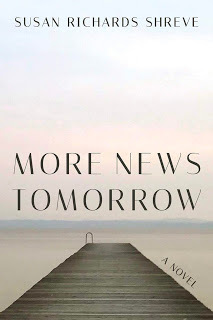
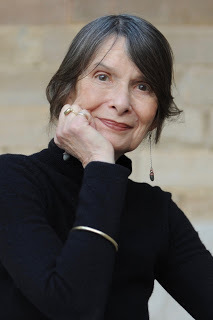
My first encounter with the magnificent Susan Richards Shreve was with her novel MIRACLE PLAY. I had just sold my very first novel, MEETING ROZZY HALFWAY, and my then editor told me that I had to read this novel, that the author and the book would change my life and help me to be a better writer. I studied that novel, every page of it, to see how I might learn from it. I still have my copy, which is now dog-eared, along with every other novel Susan has written.
Here is the official and impressive bio: Susan Shreve is the author of fifteen novels, most recently You Are the Love of My Life, a memoir Warm Springs: Traces of a Childhood and twenty-nine books for children. She has edited or co-edited five anthologies and her essays have appeared in several collections as well as The New York Times, The Washington Post and several magazines.
She was co-founder and has been a Professor in the Master of Fine Arts Program at George Mason University for more than forty years. Susan has been a Jenny Moore Fellow at George Washington University, a visiting writer at Princeton University, for several years at the School of the Arts of Columbia University, Bennington College Summer Seminars and Goucher College.
In 1985, she co-founded the PEN/Faulkner Foundation and served for thirty years most recently as Chairman. PEN/Faulkner began as an award in Fiction but developed a Writers in Schools Program in which more than 200 writers discuss their books in all of the DC public and public charter schools. The writers work as well with incarcerated youth and pregnant high school students.
She has been a recipient of a Guggenheim Fellowship in Fiction, a grant in fiction from the National Endowment for the Arts, the Grub Street Award in Non-Fiction, the Alumni Award at the Sidwell Friends School, and the Writers for Writers Award from Poets and Writers. She serves on the Advisory Board of Poets and Writers, the Advisory Board of 826DC and the board for The Cheuse International Center at George Mason University.
And here is some of the praise for her astonishing new novel, MORE NEWS TOMORROW, about a daughter struggling to understand the reasons for her mother's mysterious death:
"Shreve creates a spooky atmosphere with stormy weather, eerie parallels between past and present, and at least one threateningly crazy woman. Even spookier is the backdrop of 20th-century racism, anti-Semitism, and anti-immigration feelings that are all too familiar today.Part gothic novel, part adventure story, but primarily a meditation on surmounting misfortunes that may lie beyond an individual’s control." Starred Kirkus
“With a keen sense of place and pacing, Shreve weaves a subtle but unrelenting pattern of malevolence in this portrait of a woman burdened by the sins of her father and sustained by her unshakable belief in his innocence." Booklist
Thank you so, so much, Susan, for being here.
I always suspect that writers are haunted into writing a particular book, that there’s a “why now” feeling you can’t resist. Was it this was for More News Tomorrow? Was there something haunting you that you had to write?
I was looking through my mother’s photographs and came to one of my grandfather and grandmother who never knew sitting side by side n a rowboat on the lake of the boys camp in Northern Wisconsin which my grandfather owned.
By the time I had put away the box of pictures and gone downstairs, the man in the photograph had become a Lithuanian Jewish immigrant in June 1941 at a campsite called Missing Lake where has stopped to spend the night with his cold, anti-Semitic wife and four year old daughter. That night his wife is strangled and in the morning he confesses to the murder and is taken to the state prison.
Where that story came from I do not know…but there it was and I was driven to write it.
I loved the canoe trip, which terrified me, but kept me reading with panicked fingers. Is this something you are brave enough to do?
Obsessed, I might. But no. I like canoes but not on rivers.
Memories—what we forget, and what we only think we remember—figure prominently in this novel, which brings me to the question. Do you think the brain knows the difference between a real memory and one we have somehow pushed ourselves to believe?
I do think the brain knows--but memory is fickle and sometimes, even often, we tell ourselves the story that we want to believe is true. And then it is true.
You always have such a deep, exquisite understanding of family (and human) relationships in every book, especially this one. Do you think that writing about families has taught you something that you could not or did not learn living in the midst of real relationships?
I am from a very small family, almost no extended family and what I longed to have growing up was a large family who filled the house. I wanted safety in numbers and dependable company. I had four children and filled the house with people and my head with characters. It was of course more complicated than my imaginings but I feel as if I’ve been a student of families since I was a child for themselves and as a microcosm of the larger world.
You’ve had such a long, brilliant career, that I want to ask: has every book changed you, both in how you write and personally? How did More News Tomorrow?
I used to know the end of the book at the beginning and that was reassuring. I knew it would end. But sometime in the late nineties I would start a book with no sense of what exactly I was writing and no anticipation of its conclusion. There was a wonder in trusting that the end would surface inevitably and since then I have been conscious of my own change in the books I write.
What’s obsessing you now and why?
After my husband died three years ago, I discovered the sweet, heartbreaking suicide note his first wife had left him when she died. He was 28. And I’ve kept the black note with white script as a strange treasure. Reading it over again and again, I have fallen in love with my husband as if for the first time.
Why? There it sits—waiting for something to happen. A book. A short story. A play. Maybe a play. I l used to write plays, quite bad ones. I’d like to try again with the suicide note.
Published on June 03, 2019 10:27
May 23, 2019
Think it's difficult to raise a child today? Therese O'Neill talks about her hilarious, smart book, UNGOVERNABLE: The Victorian Parents' Guide to Raising Flawless Children.
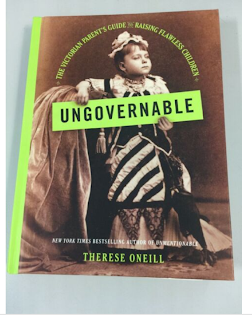
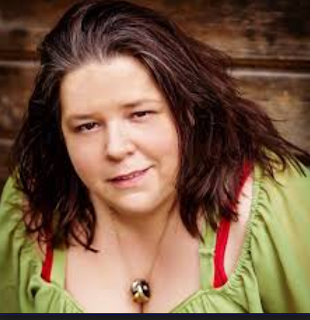
Therese Oneill is absolute one of the most hilarious people on the planet, and this compendium of terrifyingly odd parenting tips from the Victorian era is a book you want to buy extra copies of because your friends NEED this book. Therese is also the author of another fabulous book: Ummentionable: The Victorian Lady's Guide to Sex, Marriage, and Manners. Thank you so much for being here!
I love this book so much I want to marry it. How did you ever think to write about this? What was the why now moment?
First of all, thanks, Caroline. The book is too young to consider your offer of marriage but yet you honor our family name with your proposal.
I had this idea the day I signed the contract for my first book “Unmentionable.” I thought a “what to expect when you’re expecting VICTORIAN STYLE!” would be a natural follow up to a book about how to be a tidy Victorian lady. Let me loop your next question about the research being hilarious/horrifying in here.
Within a month of research I was on the phone to my agent saying “TELL THEM WE GIVE THE MONEY BACK THIS IS THE WORST IDEA FOR A FUNNY BOOK EVER O GOD IT’S ALL WHISKEY AND LEECHES THAT DON’T EVEN WORK!!”
Which my very supportive agent and editor (Jessica Papin and Jean Garnett respectively) would not allow. I am from Oregon and New York ladies just terrify me. Manhattan needs more weed and Birkenstocks.
I thought it would be hilarious. But I began my research by looking in my own collection of “Mother’s Books” of the era. And it was page after page of “how to keep your baby from dying from mumps. From malaria. From coughing too hard. From a bad a cold. From a frickin’ splinter that turned a whole leg gangrenous…”
It took twice as long to write as LB had hoped…because the research had to be circumnavigated around the absolute horror of being a child in the 19th century. Worse than even older centuries…Industrial Revolution and Westward Expansion tripling the dangers of the poor mites.
I dipped, dipped into the bleakness, it would have been just too blithe and disrespectful not to, whenever it couldn’t be avoided, particularly the story of how child abuse became against the law.
So in short, there is so much I didn’t use that I could write a whole ‘nother book about it. But I’m not going too.
Obviously, parenting is going to change yet again, and the helicopter parenting of now will probably give way to all of us raising our kids like wolves. But is there anything that you think will stay consistent?
You ask freakin’ smart questions and I love you for that. Well, I figure it’s like this. Almost other the Mother’s Books of the era, written by both respected women and doctors, would recommend never picking up a baby just because it was crying. That it must learn to self soothe if it is not it’s designated feeding time. That’s so wrong by our standards. We can take away that little innocent’s pain by just holding her, and “designated feeding time”? That’s crap! They got teeny bellies!
But there is a reason “experts” recommended that back then. Mother had three meals to cook, at least one of which involved chasing down a live animal and slaughtering it, which stoking a fire that might at any second catch the house alight while teaching the five year old to read while doing her part for the church charity committee for the new widow in town…she wanted to pick up that little bundle, as bad as any mom does. But if she did…she’d have a child who could only find comfort in her arms. And she did not have enough arms.
The environment demanded a certain sort of loving parental care. Tough love, we’d call it. She was nipping the babies suffering in the bud.
The thing that remains constant therefore, is we freakin love those little goobers. We want them to thrive, for their path to be trouble free, for them to supercede up in all things. The environment we live in dictates how we’ll do that. And if we get to the point they get to run around like wolves, hurrah for civilization, because that means we believe our children to be safe and strong.
This book could have been written in a number of ways, but I loved the quirky tone you used, and the hilarious captions of the illustrations. Did you know it was going to be that way from the get go?
I have to be a smart ass when I write. Or bare bones tragic. I prefer smartass. My first book was image heavy because so many of these forgotten things need to be SEEN to be understood. And also…heh…I love inappropriate captions. Too much Far-Side and Mystery Science Theater 3000 as a kid. The q&a format was something I hadn’t planned…but it evolved naturally. Most parenting books are q&a…plus I wanted to give all the readers who thought my “voice” (brothel madam crossed with dowager countess?) of my first book was too condescending to have a chance to argue with me. It kept the satire from becoming bitter, and I didn’t want it bitter. That’s why I die inside every time a reviewer uses the word “snark.” I am not snarky. I’m satirical. There’s a pronounced difference, the bastards. (don’t quote that);
What’s obsessing you now and why?
Lane Bryant catalogs from past decades. The women in my family have relied on them for the entirety of Ms. Bryant’s reign, over 100 years now. In the 90’s, some sort of revolution happened where fat-girl clothes because…PEOPLE clothes. Now I can literally find anything I want in size “fat” (I never owned a pair of jeans til college when they figured out to put some stretchy spandex in with the denim…it was rough going for a kid and teen) but the journey was agonizing, mystifying. All of Lane Bryant’s pre-1990 models, for instance, are size 2. I just received a catalog from the 60’s I want to dive into…I wonder how much the world would like to learn about fat chicks. Why did we hate them? Why was an ultimate sign of failure? Why did it change? Why do 1980s models look at you like they wish you’d fall off their yacht while this centuries models grin and hold their arms out to welcome you to the party? I hear you’re good at stuff like this, whaddya you think?
What question didn’t I ask that I should have?
“What took you so long, you turd?” You shoulda asked that. I deserved that. I am sorry for the delay. The timing was insurmountable because like I said…Oregonian. Thank you so much for the opportunity to overload you with information. I’m really proud you liked the book. And thank you for your time and attention.
Published on May 23, 2019 13:08
May 22, 2019
War. Prejudice. Race. And the experience of "the other." Christian Kiefer talks about his remarkable new novel PHANTOMS, and more.
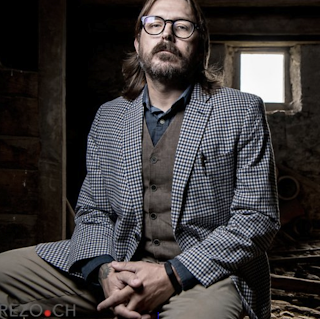
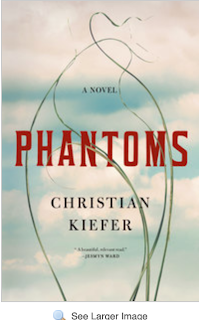
Christian Kiefer is a poet, musician and the knockout author of The Animals, One Day Soon Time Will Have No Place to Hide, and now Phantoms, a blistering great novel about war, prejudice and the Japanese-American experience. I'm not the only one to love this novel with a passion. Take a look at these raves:
“Haunting.... Ray’s poignant suffering is but one example of the bigotry and fear experienced by Japanese born U.S. citizens after Pearl Harbor, the same bigotry and fear of the other that still sadly exists in America today.... YA: Ray’s story of young love and loss as well as an often omitted aspect of WWII history will resonate with teens.” — Deborah Donovan, Booklist
“Kiefer's sweeping novel (after One Day Soon Time Will Have No Place to Hide) examines the ways war shapes the lives of ordinary people.... Kiefer's story sheds light on the prejudice violence ignites and on the Japanese American experience during a fraught period of American history, and makes for engaging and memorable outing.” — Publishers Weekly
“Sweet life spills from every perfect word. It will break your heart, and in the breaking, fill you with bittersweet but luminous joy.” — Kirkus Reviews (starred review)
“Set in the golden foothills of the Sierra Nevada and spanning the middle decades of the twentieth century, Phantoms tells the intertwined stories of two families, two wars, and two soldiers trying to make their way home. Exploring the brutal legacies of racism and war with unflinching honesty and incandescent prose, this novel asks: Who gets to tell their stories, and who doesn’t? What if you’re entrusted with—or thrust into—someone else’s story? Who gets to find their way home?” — Naomi J. Williams, author of Landfalls
“Christian Kiefer is a masterful writer, and this magisterial novel is aching with beauty and power. This is a great book.” — Luis Alberto Urrea, author of The House of Broken Angels
I always think that writers are haunted into writing the books they write. What was haunting you?
I think hauntingis a great way to put it; the haunting here has largely to do with my community—not just in terms of where I grew up but people who look like me and, conversely, who don’t. I live in semi-rural Placer County, a place that has doubled in size since I was a child here but which is still basically a small town. Perhaps 12K population in all, and not part of any kind of urban sprawl. But you know, communities like mine are wonderful in a great many ways but they can also be inflexible, fearful, racist, insular, and so on. I love my community, but there was a story in its history that needed to be talked about, a kind of shame that we hold in our past, one common to the western states during the period of the second world war.
Published on May 22, 2019 12:05
April 12, 2019
The amazing Marcia Butler talks about twins, writing, being a master of many art forms, identity, New Yorkers, and her wonderful racking-up-the-raves novel PICKLE'S PROGRESS
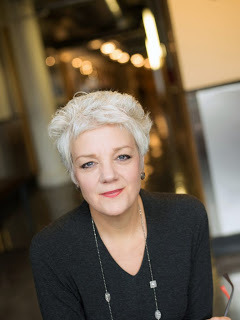
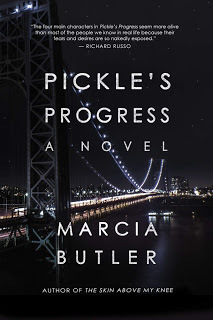
Marcia Butler is amazing. She's not only one of my favorite people on the planet, but she's been a professional musician, interior designer, documentary filmmaker, and author. As an oboist, the New York Times has hailed her as a “first rate artist.” During her musical career, she performed as a principal oboist and soloist on the most renowned of New York and international stages, with many high-profile musicians and orchestras – including pianist Andre Watts, and composer/pianist Keith Jarrett. Her interior designs projects have been published in numerous shelter magazines and range up and down the East coast, from NYC to Boston, to Miami. The Creative Imperative, her documentary film exploring the essence of creativity, will release in Spring 2019. Marcia’s nationally acclaimed memoir, The Skin Above My Knee, was one of the Washington Post’s “top ten noteworthy moments in classical music in 2017”. She was chosen as 2017 notable debut author in 35 OVER 35. Her writing has been published in Literary Hub, PANK Magazine, Psychology Today, Aspen Ideas Magazine, Catapult, Bio-Stories and others. Marcia was a 2015 recipient of a Writer-in-Residence through Aspen Words and the Catto Shaw Foundation. She was a writing fellow at the Virginia Center for the Creative Arts, and a writer in residence at The Betsy Hotel.
Her new novel PICKLE'S PROGRESS is astonishing. Don't believe me? Just look at these raves:
“A suicidal jump off the George Washington Bridge sets the lives of four New Yorkers careening out of control in the mordant debut novel by memoirist Butler…. With detached wit and restrained horror at her characters’ behavior, Butler explores the volatile nature of identity in this provocative novel.” —Booklist
“Identical twins Stan and Pickle McArdle live tangled lives, fulfilling expectations imposed on them in childhood by their controlling mother… Butler’s debut is character-driven…the book starts with a crash then slows as the characters’ personalities develop. In this study of how childhood experiences shape perception, and how deception keeps people caged, Butler shows that nothing need be set in stone.”—Kirkus Reviews
“The four main characters in Pickle’s Progress seem more alive than most of the people we know in real life because their fears and desires are so nakedly exposed. That’s because their creator, Marcia Butler, possesses truly scary X-ray vision and intelligence to match.” —Richard Russo
“Oh, what a pickle Pickle’s Progress puts us in–a duke’s mixture of villainy, deceit, betrayal, and, Lord help us, romantic love–all of it rendered in prose as trenchant as it is supple. Clearly, Ms. Butler is in thrall to these fascinatingly flawed characters (us, but for time, circumstance, and bank account), and by, oh, page 15 you will be, too. Let’s hope this is just the first of many more necessary novels to come.” —Lee K. Abbott, author of All Things, All at Once
“How does healing happen? Sometimes in quirkier ways than you might expect. Butler’s blazingly original novel debut (her memoir The Skin Above My Knee made me want to run away and join an orchestra) is a quintessential moving, witty, New York City story about the love we think we want, the love we get, and the love we deserve, all played out with symphonic grace. I loved it.” —Caroline Leavitt, New York Times Bestselling author of Pictures of You and Cruel Beautiful World
“Like the first icy slug of a top-shelf martini, Marcia Butler’s debut novel is a refreshing jolt to the senses. Invigorating, sly and mordantly funny, Pickle’s Progress offers a comic look at the foibles of human nature and all the ways love can seduce, betray and, ultimately, sustain us.” —Jillian Medoff, bestselling author of This Could Hurt
“Marcia Butler’s debut novel Pickle’s Progress is funny, sharp, totally original, and completely engrossing. It joins the pantheon of great New York novels. I loved every page.” —Julie Klam, New York Times bestselling author of The Stars In Our Eyes
“Marcia Butler’s debut novel, Pickle’s Progress, is a fierce and glorious NY story. Written in brave and startling prose, Butler has written a fast-paced tale of identical twin brothers and the women in their orbit, who collide and dance in a haunting tale of tragedy, passion and love. Throughout this surprising work, we see NY in all its beauty and raunchiness, with a finely tuned soundtrack, so that the city itself becomes an integral part of the complex and compelling plot. Rare is the brilliant memoirist who also writes fiction with the same sure hand, but Marcia Butler is such an author.” —Patty Dann, bestselling author of Mermaids
“Pickle’s Progress is a wild trip into the heart of New York City with wonderful, complicated, highly functioning alcoholics as tour guides. Marcia Butler’s characters are reflections of the city they live in: beautiful but flawed, rich but messed up, dark and hostile – but there’s love there, if you know where to find it. Butler’s sharp, artistic sensibilities shine through here, and the result is a brutal, funny story of family, regret, and belonging.” —Amy Poeppel, author of Limelight
“New York City is all about three things: Money, Real Estate and Sex. In Pickle’s Progress, Marcia Butler has neatly tied them all together by focusing on one scarily dysfunctional family. You’ll laugh, you’ll cry, you’ll shake your head, but you’ll keep turning those pages to find out what happens to Karen, Stan, Junie and Pickle in this riveting, dramatic version of musical chairs.” —Charles Salzberg, author of Second Story Man and the Shamus Award nominated Henry Swann series.
I cannot thank you enough, Marcia!
Q) What inspired you to write this story about twins and complicated family relationships? How does their relationship exemplify the themes or messages you wanted to examine?
A) A few things came together for me when I began this novel. The surface inspiration was a set of identical twin sisters I knew from college days. One of them had just become engaged and confided in me that she was worried that her fiancé was attracted to her sister, who appeared virtually indistinguishable. She summoned the courage to ask him and he denied any attraction whatsoever. She felt reassured and relived. (They are still married!) Yet, I remained suspect; how could he not be attracted to the sister? This notion became the territory which I then explored more deeply in my novel regarding nature vs. nurture in family of origin.
Another influence inserted itself into Pickle McArdle’s character and story line in an almost stealth way. I recognized this only after the book was complete. This is an example of how the author will most assuredly insert some aspect of herself because she is writing from her personal psychological prism, and cannot help doing so. I came from a large family with five children and was always painfully aware that I was not the favored child. And it became my childhood mission to first, somehow understand why I was so low in the pecking order, and second, to try and be a “better” child so I might float to the top. That never happened. But this imprint of the child’s struggle to please the parent who could never be pleased, landed squarely in my novel.
My protagonist, Pickle McArdle, is the least favored twin. Growing up, his mother prefers his brother, Stan, in the most appalling and damaging of ways. Pickle bears these scars well into his adult life and the impact of this neglect informs the relationships he has with women. That being said, the bond of identical twins is significant. In spite of their disparate upbringings, the McArdle twins still seem to pull strength and purpose from each other. The deep connection of twin-ship is juxtaposed with a mother’s effort to destroy her least favored son. My novel watches this rub play out as Pickle tries to get the love he never had.
Q) Your main characters Pickle and Stan are wonderfully imperfect and what Richard Russo described as “more alive than most of the people we know in real life.” What is your approach to writing characters that are nuanced and deeply human?
A) It will become obvious to anyone who reads my novel that I am not afraid for my characters to behave badly, hurt each other, and most importantly, hurt themselves. A lot of mischief goes on and I was comfortable allowing my characters a wide berth to behave in ways that defy some manner of “literary logic.” Because real life is, and always will be, bigger and larger and stranger than most fiction. Based on my observations of people throughout my life, where much behavior was not logical, I gave myself permission to let the stops out with regard to recklessness. It doesn’t mean my characters are bad people. Rather, what I hope comes through is that they are damaged souls. And this contrary notion – the surface action and the underlying reason for that action – has always been an aspect of how I see people reveal their true vulnerability. As my characters take risks and surprise the reader, they are exposing themselves in ways that raise the stakes of their lives and this presses the plot forward to an unimaginable conclusion.
Q) What was the experience like when you made the shift from writing personal nonfiction to creating fictional characters and the world they live in?
A) Freedom. That pretty much sums up the overwhelming sensation I had when writing about people I could make up and bring to life, rather than tacking strictly to the facts and people in my own life as I had for my memoir. The characters in my novel are completely unfamiliar to me and I was happy to meet them and eager to see where they would take me. With that in mind, I had no plot laid out beforehand and I let Pickle drive the bus. While writing this novel, I had the distinct sensation that I was sight-reading a piece of music I’d never heard before. So, the discovery of the story unfolded as if the notes were being played for the very first time. Risky and wonderful. I should have been afraid – but I’ve always been a bit of a renegade and have taken many chances throughout my life with regard to how my creative expression has emerged.
Q) What was the most challenging part of writing this novel? What was the most fun?
A) Learning the craft of novel-writing while I wrote the novel, was surely a challenge. In all art forms one needs to understand and perfect the rules before one can break them. Though, I took some comfort in the fact that I’d written a memoir and even in that context, the author still needs to fashion a really compelling narrative. This is my first novel so I proceeded by trial and error – almost like feeling my way along a dark tunnel. That wasn’t an altogether bad feeling, though, because I’m old enough to know how to tolerate the discomfort of difficulty and frequent defeat. And the fun came, ironically, in the exact same way! What a great thing to navigate a new art form and come out the other side, so much richer for the experience. I did this thing – a novel! And looking back, I still have a hard time believing it!
Q) What is the significance of the book’s title? How was it chosen?
A) The title, which is meant to be ironic, came to me fairly early on. I love alliteration, so I stayed with the P’s. Pickle is working on all cylinders to manipulate all the people in his life in order to get what he thinks he wants: true love. Yet, with all of his shenanigans, he’s actually running in place. It isn’t until the very end of the novel that Pickle realizes the truth: his heart’s desire was always there, right in front of him. It’s a kind of “no place like home” moment.
Q) You are an accomplished artist of many mediums. How has your experience in music, interior design, and film informed your writing?
A) Past artistic careers have set up an architecture of aesthetic discernment that informed my memoir and now, my novel-writing. My journey as a writer in many ways feels intuitive, but I know that is not really the case. Music, art and design, and film making all provide a foundation which I’ve funneled into my writing. All art forms are vehicles for storytelling and exploring the human condition. The transaction of the artist to the receiver is universal: The artist creates. The art is then in the world. The world then experiences the gift of the art. With this in the forefront of my mind, I can explore freely because I understand the nature of making art in the world. I try not to think about exact influence because I consider life to be a continuum of experience. Everything is connected. Everything.
Published on April 12, 2019 09:31
April 11, 2019
The brilliant Myla Goldberg talks about art, ownership, mothers and daughter and her astonishing new novel, FEAST YOUR EYES--and, oh yes, why chocolate must have 65% cacao to be even considered edible.
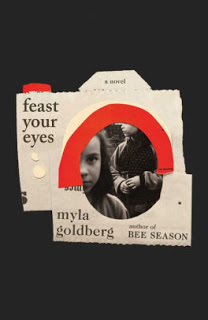 THE book
THE book
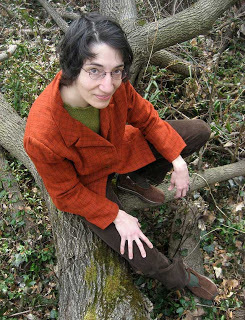 Portrait of THE author
Portrait of THE authorYou know that anything that Myla Goldberg writes is going to be brilliant, evocative, and a book you will inhabit. FEAST YOUR EYES, about art, mothers and daughters, and how far we can push those boundaries, is both structurally innovative, and also deeply, deeply moving. And yes, a little disturbing, too, but that is a plus. I'm not the only one to love this novel. Take a look at these raves:
A mother-daughter story, an art-monster story, and an exciting structural gambit.” —Lit Hub
“From Bee Season (2000) onward, Goldberg has portrayed girls and young women with fluent sensitivity. In her brilliantly structured fourth novel, she revisits the theme again, in the story of photographer Lillian Preston, who, chronically shy yet determined, flees Cleveland for New York in 1953 at 17 and becomes an accidental single mother at 19... This is a novel of infinite depth, of caring authenticity both intimate and societal, of mothers and daughters, art and pain, and transcendent love.” —Booklist, STARRED
“A riveting portrait of an artist who happens to be a woman.” —Kirkus Reviews, STARRED
“Goldberg evocatively profiles a brilliant woman whose identities—as woman, artist, and mother—are inseparable from one another... a memorable portrait of one artist’s life.” —Publishers Weekly
“Reading Myla Goldberg’s Feast Your Eyes reminded me of other unlikely adventure stories, like Hillary’s summit of the Himalayas, or Shackleton’s return from Antarctica. Only here the human constraints are still more challenging: making art as a single mother in a twentieth century dominated, and distorted, by men. This is an unflinching, deeply moving portrait of the artist, and a bravura performance in and of itself. I loved this book.” —Joshua Ferris, author of Then We Came to the End and To Rise Again at a Decent Hour
Myla Goldberg is is a bestselling novelist, winner of the Borders New Voices Prize, a finalist for the Hemingway Foundation/PEN award, the NYPL Young Lions award, and the Barnes & Noble Discover award, and recipient of a Sustainable Arts Foundation grant. She writes and teaches in Brooklyn, where she lives with her husband Jason Little and their two daughters.
Thank you so much for being here, Myla.
I always think that writers write the books that truly haunt them. What happened that made you know that this is the novel you had to write next?
<!-- /* Font Definitions */ @font-face {font-family:"Cambria Math"; panose-1:2 4 5 3 5 4 6 3 2 4; mso-font-charset:0; mso-generic-font-family:roman; mso-font-pitch:variable; mso-font-signature:-536870145 1107305727 0 0 415 0;} @font-face {font-family:Calibri; panose-1:2 15 5 2 2 2 4 3 2 4; mso-font-alt:Calibri; mso-font-charset:0; mso-generic-font-family:swiss; mso-font-pitch:variable; mso-font-signature:-536859905 -1073732485 9 0 511 0;} /* Style Definitions */ p.MsoNormal, li.MsoNormal, div.MsoNormal {mso-style-unhide:no; mso-style-qformat:yes; mso-style-parent:""; margin:0in; margin-bottom:.0001pt; mso-pagination:widow-orphan; font-size:12.0pt; font-family:"Times New Roman",serif; mso-fareast-font-family:Calibri;} .MsoChpDefault {mso-style-type:export-only; mso-default-props:yes; font-size:10.0pt; mso-ansi-font-size:10.0pt; mso-bidi-font-size:10.0pt; mso-fareast-font-family:Calibri; mso-bidi-language:HE;} @page WordSection1 {size:8.5in 11.0in; margin:1.0in 1.0in 1.0in 1.0in; mso-header-margin:.5in; mso-footer-margin:.5in; mso-paper-source:0;} div.WordSection1 {page:WordSection1;} </style></div><div class="MsoNormal">What happened to me was children.<span style="mso-spacerun: yes;"> </span>As I struggled to be the mother I wanted to be, while simultaneously struggling to be the writer I wanted to be, I found myself wondering if there were any examples of excellent artists who were also excellent, engaged parents.<span style="mso-spacerun: yes;"> </span>Is it possible to be both or does one ambition require compromising the other?</div><div class="MsoNormal"><br /></div><div class="MsoNormal"><i>I absolutely love the structure of the novel, how it pulls you in through catalogue entries. I never realized how brilliantly a story could be told that way. <span style="mso-spacerun: yes;"> </span>What were some of the triumphs in working this way—and some of the writerly pitfalls for you?</i></div><div class="MsoNormal"><br /></div><div class="MsoNormal">I love coming across a book that explores a story in an unexpected way, so playing with a new approach to story was exhilarating.<span style="mso-spacerun: yes;"> </span>I get tired of telling stories that toddle along all conventional-like: I get bored.<span style="mso-spacerun: yes;"> </span>But, oh, the pitfalls!<span style="mso-spacerun: yes;"> </span>Trying to keep the entries consistently relevant was hard – how to tie the photo into what was happening in the larger story without it seeming forced?<span style="mso-spacerun: yes;"> </span>How to make the reader consistently care about a photo when exciting and distracting things were happening elsewhere?<span style="mso-spacerun: yes;"> </span>Then there were all the first-person voices: I hate it when I read a novel that proports to be told from several different characters’ perspectives, and instead all I get are very slight variations on the author.<span style="mso-spacerun: yes;"> </span>After a while, I got tired of complaining about this and decided I could retain complaining rights only if I tried it myself.<span style="mso-spacerun: yes;"> </span>So this book is me, trying.<span style="mso-spacerun: yes;"> </span></div><div class="MsoNormal"><br /></div><div class="MsoNormal"> <i>What startled you the most about your research, and was there anything that made you rethink your plot? </i> </div><div class="MsoNormal"><br /></div><div class="MsoNormal">Reading about abortion in the pre-Roe v. Wade era was more than startling: it was horrifying.<span style="mso-spacerun: yes;"> </span>I knew, intellectually, that it was difficult to obtain an abortion at that time, but I had no concept of what it actually entailed.<span style="mso-spacerun: yes;"> </span>What I learned about the paucity of information and lack of access to birth control, as well as the dangers and risks of finding and getting an abortion left an indelible mark on the story.<span style="mso-spacerun: yes;"> </span>Another biggie was what I learned about women and New York City’s criminal justice system in the early 60s.<span style="mso-spacerun: yes;"> </span>I modeled Lillian’s experience of jail on the experiences of women in the only dedicated women’s prison in the city at that time, a prison that was torn down several years later after the scale of the human rights violations perpetrated inside its walls was revealed.<span style="mso-tab-count: 1;"> </span></div><div class="MsoNormal"><br /></div><div class="MsoNormal"><i>Do you think that all art has a cost? And that everything is art?<span style="mso-tab-count: 1;"> </span></i></div><div class="MsoNormal"><br /></div><div class="MsoNormal">Every choice we make has a cost. One of the things that scares me most about these times is our collective inability or unwillingness to acknowledge that.</div><div class="MsoNormal"><br /></div><div class="MsoNormal"><i>I have to ask because I am suffering over titling my novel, how do you come up with your titles? This one Feast Your Eyes, is particularly great.<span style="mso-tab-count: 1;"> <br /> </span><span style="mso-tab-count: 6;"> </span></i></div><div class="MsoNormal">Oy, titles.<span style="mso-spacerun: yes;"> </span>This one took me many years to stumble over.<span style="mso-spacerun: yes;"> </span>Previously, my titles always came quickly, so not having a title for this book for so long really threw me.<span style="mso-spacerun: yes;"> </span>Finally, I sat down to read it when I was in editing mode, keeping an eye out for phrases that resonated for the larger book.<span style="mso-spacerun: yes;"> </span>“Feast your eyes” are the words Lillian’s daughter uses to start her first catalog entry, and as soon as I saw them, I knew.</div><div class="MsoNormal"><i><span style="mso-tab-count: 8;"> </span><span style="mso-tab-count: 2;"> </span></i></div><div class="MsoNormal"><i>What’s obsessing you now and why?<br style="mso-special-character: line-break;" /><br style="mso-special-character: line-break;" /></i></div><div class="MsoNormal">The arbitrary nature of our country’s immigration system. The rules that govern if someone can stay or go, and the subjective nature of those rules’ interpretation by a judge are mind-boggling.<span style="mso-spacerun: yes;"> </span>There is nothing constitutional about it, and it shames me that the ready answer to that observation is that the constitution is only meant to apply to citizens.<br /><br /><i>What question didn’t I ask that I should have?</i></div><div class="MsoNormal"><br /></div><span style="font-family: "times new roman" , serif; font-size: 12.0pt;">Bare minimum is 65% cacao.<span style="mso-spacerun: yes;"> </span>Anything less doesn’t taste like chocolate to me.</span> <style><!-- /* Font Definitions */ @font-face {font-family:"Cambria Math"; panose-1:2 4 5 3 5 4 6 3 2 4; mso-font-charset:0; mso-generic-font-family:roman; mso-font-pitch:variable; mso-font-signature:-536870145 1107305727 0 0 415 0;} @font-face {font-family:Calibri; panose-1:2 15 5 2 2 2 4 3 2 4; mso-font-alt:Calibri; mso-font-charset:0; mso-generic-font-family:swiss; mso-font-pitch:variable; mso-font-signature:-536859905 -1073732485 9 0 511 0;} /* Style Definitions */ p.MsoNormal, li.MsoNormal, div.MsoNormal {mso-style-unhide:no; mso-style-qformat:yes; mso-style-parent:""; margin:0in; margin-bottom:.0001pt; mso-pagination:widow-orphan; font-size:12.0pt; font-family:"Times New Roman",serif; mso-fareast-font-family:Calibri;} .MsoChpDefault {mso-style-type:export-only; mso-default-props:yes; font-size:10.0pt; mso-ansi-font-size:10.0pt; mso-bidi-font-size:10.0pt; mso-fareast-font-family:Calibri; mso-bidi-language:HE;} @page WordSection1 {size:8.5in 11.0in; margin:1.0in 1.0in 1.0in 1.0in; mso-header-margin:.5in; mso-footer-margin:.5in; mso-paper-source:0;} div.WordSection1 {page:WordSection1;} </style><br />-->
Published on April 11, 2019 15:09
April 6, 2019
A fierce eloquent look at Hawai‘i that goes beyond the resorts. Liz Plato talks about this, love, loss, and more in her racking-up-the-raves collection of essays, Volcanoes Palm Trees & Privilege
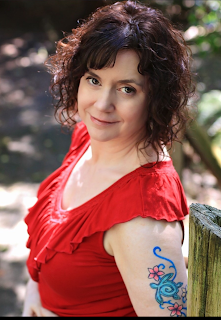
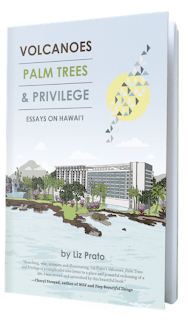
Liz Prato is the author of the short story collection, Baby's on Fire and editor of The Night, and the Rain, and the River: 22 Stories. Her stories and essays have appeared in dozens of literary journals and magazines, including Hayden's Ferry Review, Carolina Quarterly, Baltimore Review, The Rumpus, Salon, Hunger Mountain, and ZYZZYVA. She is the Editor at Large for Forest Avenue Press.
A Tennessee Williams Scholar at the 2012 Sewanee Writers Conference and a frequent attendee of the Tin House Summer Writers Workshop, Liz has been privileged to study with Steve Almond, Aimee Bender, Charles D'Ambrosio, Anthony Doerr, Jim Shepard, and many other talented authors. Liz lives with her furry feline friends and her best friend/husband, who is a bookseller, musician, and writer in Portland, Oregon.
Her latest book Volcanoes Palm Trees & Privilege offers an incredible journey, as well as a deeply personal tale of love and love. Here's just some of the raves:
“Liz Prato’s profound meditations on place dislocate and then relocate understandings of Hawaiʻi from the point of view of the non-native visitor. This book is a love letter to the land and people of Hawaiʻi, with a keen awareness that some people must let their story of this place go. Breathtaking." —Lidia Yuknavitch, author of The Chronology of Water and Book of Joan
"Volcanoes, Palm Trees, and Privilege is not only a breezy and appealing primer on how to negotiate both Hawai’i in all its astonishing variety and the enormous advantages and nagging burdens of privilege; it’s also a moving memoir about familial loss and the reconstitution of an essential version of the self. Liz Prato is beautifully smart about how disempowerment works, and how to combat it." —Jim Shepard, author of The Book of Aron, and The Tunnel at the End of the Light
"In Volcanoes, Palm Trees, and Privilege we witness a deeply personal tale of love, loss, and honest accounting as the author comes to understand her relationship with the islands through the crucible of family.” —Kristiana Kahakauwila, author of This Is Paradise
“A brilliant meditation on cheeseburgers in paradise, Liz Prato’s fearless and tender investigation of our complex relationship with Hawai‘i will blow your mind. Hula dancers, aloha shirts, surfing, and the idyllic tropical vacation will never look the same. It’s a reckoning whose time is long overdue.” —Karen Karbo,author of In Praise of Difficult Women, and the Kick-Ass Women series
"Prato’s work stays winningly informal and idiosyncratic throughout and . . . coalesces into an intriguing and informative journey through the 50th state."--Publishers Weekly
I always want to know what is haunting a writer into writing the book that they write? Why write about Hawaii now?
When I first started writing about it, there was no sense of why now? I started writing about Hawai‘i because I love it and am obsessed with it and could only hope it would matter to other people in some way. But since I started writing the book, we’ve become way more conscious of issues of privilege, and of native people—their rights, their land, their lives, and how colonialism continues to try to steal their culture. Hawai‘i also keeps showing up in the headlines for varied reasons: because Trump’s international relations made it necessary to implement a monthly test of an air attack warning signal (and the unfortunate “oops” that happened when it was triggered a year ago); how the 9th Circuit Court in Hawai‘i has made significant rulings against Trump; how the massive destruction of last year’s eruption of Kilauea reminds us of the ferocity of nature.
I happen to love Hawaii, too, but Oahu, not Maui, which to us, was a very different, experience. And it’s funny, you came to understand the islands through your family—so did we. Driving through Maui exhausted us, and the beaches disappointed us, but Oahu brought us together in one terrifyingly exhilarating swim under a waterfall. How do you think nature does that alchemy? And why Hawaii particularly?
Wow, the swim under the waterfall story is cool! I think part of the alchemy is because in Hawai‘i, you’re always as close to nature as you are to human-made structures. Even if you’re in the middle of downtown Honolulu, you’re two miles from the waves and currents of the Pacific Ocean, and three miles from the jungle interior of O‘ahu. You’re surrounded by water, and how far you can travel is constrained by it. Tsunami warning signals are tested every month. Everywhere you look are volcanoes, or proof of volcanoes. You’re constantly reminded that nature is bigger and more powerful than we are, and that you’re somewhat at its mercy on this isolated archipelago. I think that brings us closer to that organic piece of us—of what we are made of, of where we come from—and we also realize that we need each other to survive.
Being a white tourist in a land that has been spoiled by white people—tourists and colonists—is unsettling to read about. Can you talk about this please?
It became the question I couldn’t ignore. If you put on blinders and don’t look beyond the resort you’re staying in, and don’t read the newspapers or watch the news, you could go to Hawai‘i and not think about it. And there might be something about how often I’ve been there, that each time I wanted to experience Hawai‘i differently and wanted to learn more, that opened me up to how Hawaiians were talking about these issues. They were talking about how their land was stolen, their language was pushed to the margins, their people were killed, their monarchy was deposed by a coup orchestrated by the U.S., and how modern Native Hawaiians have higher rates of poverty, unemployment, houselessness and serious health issues than their non-Native counterparts. Oh, but I’ll just go lie by the pool that uses 500,000 gallons of water and order drinks from someone who has to work three jobs in order to afford the exorbitant cost of living in Hawai‘i and just be la-la-la about it? No, I’m going to approach the land and people of Hawai‘i with more respect.
I get that people who are paying thousands of dollars for a vacation don’t want their paradise goggles to get fogged by such complicated issues. It’s not a lot of fun. But the idea that we are entitled to fun without being interrupted by the realities of how we impact other people and places is a very basis of privilege. I don’t believe anyone should feel ashamed of or apologize for whatever privilege they’ve been granted in life. But that doesn’t mean we should ignore it, either. Earth is one big interconnected organism, and how we behave—whether at home or on vacation—has an effect on it. We have the choice to make a positive impact or a negative one. It really doesn’t take that much to be respectful. And if anyone needs a “but how does this benefit me?” reason, then there’s this: It helps us see and feel how we’re all connected. It allows us to have gratitude, and enhances our satisfaction.
Did writing about a place when you came back home make you rethink what you had experienced at all? How so?
Oh my god yes, so much! And let me tell you, it was a long look back. When I was visiting as a teenager I didn’t think about Native Hawaiians and their land at all. I had local friends, so it’s not like I was completely insulated from the realities of living in Hawai‘i, but my entire understanding of Hawai‘i still sprung from the expectation that they wanted and needed white people to be there. That we had a right to be there (insert giant eye-roll here). My dad was a white mainlander who bought and developed land on Maui, and I didn’t question it. But even by the time I was in my early twenties, my brother and I were feeling weirdly dislocated by the massive development going on in South Maui. Beaches that we used to go to with our local friends were being built on with condos and hotels. And the hotels were really glitzy, these fantasy destination resorts that looked like they belonged in Las Vegas, but didn’t seem to have much to do with Hawai‘i. But I don’t think we had any sense of the way our family was complicit in that happening. It wasn’t until the last five years that it kind of hit me: oh, my dad was the bad guy. He was the guy contributing to the people getting further from the ‘āina (the land). So, it didn’t make me just rethink my current relationship with Hawai‘i, but the entire genesis of my love for it.
What’s obsessing you now and why?
GenX. How did we get here? What happened to those of us who didn’t survive? Just from my tiny private high school, I have personal connections to a lot of stories that reflect so many of the current socio-political issues we’re grappling with. A high school friend came from this liberal peace-loving family, but her younger brother became a skinhead and died in a dramatic police shoot out. Another friend was studying abroad in London in 1988, and a dozen of her friends—including her best friend—were on the Pan Am flight that was blown up over Lockerbie Scotland. One of my best friends from high school was a total hippie—we participated in peace demonstrations together—and now he’s a staunch conservative. And it was recently revealed that my high school had hired a teacher back in the eighties who was a sexual-offender in all the previous prep schools he taught at, but no one in authority ever shared that information. They just “passed the trash” to other schools, and he was allowed to go on abusing teen girls. It’s all part of the same puzzle, so I’m exploring those stories in essays and (an attempt at) a novel.
What question didn’t I ask that I should have?[my mind is so completely wiped out from AWP that I can’t think of a thing!]
Published on April 06, 2019 15:01
April 2, 2019
Need a funnybone boost that actually might change your life? The divine Mary Laura Philpott talks about why we're all a little out of sync, why being happy all the time is not the answer, how midlife crisis can strike anytime, and more in her wise and hila
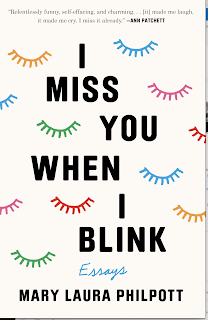

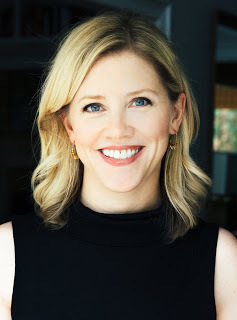
Mary Laura Philpott is totally cool. I mean, really cool. She's so enthusiastic about books, so warm and funny, you really want her to be your best friend. And her book, I Miss You When I Blink is phenomenal, the kind of book you want to give to all your friends--and your enemies, too, because it will surely make them better people. And isn't the cover the most wonderful cover you've ever seen?
But I'm not the only one raving about this book. I Miss You When I Blink was and is: *A Most Anticipated Book of 2019 by BuzzFeed, The Millions, Bustle, HelloGiggles, and Lit Hub*A Best New Book of Spring 2019 according to Esquire, Southern Living, and Chicago Review of Books. * *And #1 on the IndieNext List by booksellers across the country.
Mary Laura Philpott is also the author and illustrator of a little humor book called Penguins with People Problems; a writer whose work appears in publications including The New York Times, The Paris Review, The Washington Post, O The Oprah Magazine, and others; the founding editor of MUSING, the digital magazine published by Parnassus Books; and an Emmy-award winning co-host of A Word on Words, a literary interview show on Nashville Public Television. And you really want to follow her on instagram, too.
<!-- /* Font Definitions */ @font-face {font-family:Helvetica; panose-1:0 0 0 0 0 0 0 0 0 0; mso-font-charset:0; mso-generic-font-family:auto; mso-font-pitch:variable; mso-font-signature:-536870145 1342208091 0 0 415 0;} @font-face {font-family:"Cambria Math"; panose-1:2 4 5 3 5 4 6 3 2 4; mso-font-charset:0; mso-generic-font-family:roman; mso-font-pitch:variable; mso-font-signature:-536870145 1107305727 0 0 415 0;} @font-face {font-family:"Arial Unicode MS"; panose-1:2 11 6 4 2 2 2 2 2 4; mso-font-charset:0; mso-generic-font-family:roman; mso-font-pitch:auto; mso-font-signature:0 0 0 0 0 0;} /* Style Definitions */ p.MsoNormal, li.MsoNormal, div.MsoNormal {mso-style-unhide:no; mso-style-qformat:yes; mso-style-parent:""; margin:0in; margin-bottom:.0001pt; mso-pagination:widow-orphan; font-size:12.0pt; font-family:"Times New Roman",serif; mso-fareast-font-family:"Arial Unicode MS"; border:none;} p.Default, li.Default, div.Default {mso-style-name:Default; mso-style-unhide:no; mso-style-parent:""; margin:0in; margin-bottom:.0001pt; mso-pagination:widow-orphan; font-size:11.0pt; font-family:Helvetica; mso-fareast-font-family:"Arial Unicode MS"; mso-hansi-font-family:"Arial Unicode MS"; mso-bidi-font-family:"Arial Unicode MS"; color:black; border:none;} .MsoChpDefault {mso-style-type:export-only; mso-default-props:yes; font-size:10.0pt; mso-ansi-font-size:10.0pt; mso-bidi-font-size:10.0pt; mso-fareast-font-family:"Arial Unicode MS"; border:none;} .MsoPapDefault {mso-style-type:export-only;} @page WordSection1 {size:8.5in 11.0in; margin:1.0in 1.0in 1.0in 1.0in; mso-header-margin:.5in; mso-footer-margin:.6in; mso-paper-source:0;} div.WordSection1 {page:WordSection1;} </style></div><br /><div class="MsoNormal"></div><span style="font-size: small;"> </span><br /><div class="MsoNormal"><span style="font-size: small;"><b>I Miss You When I Blink has been called a pep talk from a beloved sister (which I loved). Who gives YOU the pep talks you need, besides yourself?</b></span></div><span style="font-size: small;"> </span><br /><div class="MsoNormal"><br /></div><span style="font-size: small;"> </span><br /><div class="MsoNormal"><span style="font-size: small;">Pep talks are everywhere, if you look for them — especially in nature. Plants and animals are all about persistence and resilience. There’s a reason they make motivational posters with pictures of flowers growing out of cracks in sidewalks and caterpillars turning into butterflies. You want a pep talk? Go outside.</span></div><span style="font-size: small;"> </span><br /><div class="MsoNormal"><br /></div><span style="font-size: small;"> </span><br /><div class="MsoNormal"><span style="font-size: small;">But also: I’m not one bit ashamed to text someone and say, “Help, I need a pep talk.” Luckily, I have friends who are great pep-talkers.</span></div><span style="font-size: small;"> </span><br /><div class="MsoNormal"><br /></div><span style="font-size: small;"> </span><br /><div class="MsoNormal"><span style="font-size: small;"><b>I loved these lines: “Maybe we all walk around assuming everyone is interpreting the world the same way we are, and being surprised when they aren’t, and that’s the loneliness and confusion of the human experience in a nutshell…” Can you talk a bit about this please?</b></span></div><span style="font-size: small;"> </span><br /><div class="MsoNormal"><br /></div><span style="font-size: small;"> </span><br /><div class="MsoNormal"><span style="font-size: small;">Sure! That’s from the “Lobsterman” essay, in which I give repeated examples of getting things wrong — all the times when everyone around me in school understood the instructions, and I veered off and did some weird other thing. That quote also speaks to an idea that comes up again and again in the book, which is this: So often, we go around thinking, “No one understands me,” or “I don’t understand that person,” when really, it’s just that we’re all a little out of sync with one another. We go through different phases and experiences at different times in life, and my frame of reference may not be the same as yours in a particular moment. It can be so isolating — and unnecessarily so.</span></div><span style="font-size: small;"> </span><br /><div class="MsoNormal"><br /></div><span style="font-size: small;"> </span><br /><div class="MsoNormal"><span style="font-size: small;">Paradoxically, both these things are true: We can never understand anyone else, because everyone is different. And we can always understand each other, because we’re all at least a little bit the same. </span></div><span style="font-size: small;"> </span><br /><div class="MsoNormal"><br /></div><span style="font-size: small;"> </span><br /><div class="MsoNormal"><span style="font-size: small;">I also loved that you made note of the fact that depression and midlife crisis can hit at any time, and that we all waste a whole lot of time trying to craft that perfect existence. I also feel that social media doesn’t help, because everyone seems happy, celebrating, gorgeous and etc. Plus, what really is the perfect existence—and does that perfection change through time? Do you think that maybe the goal of happy, happy, all the time, should be replaced with content sometimes?</span></div><span style="font-size: small;"> </span><br /><div class="MsoNormal"><br /></div><span style="font-size: small;"> </span><br /><div class="MsoNormal"><span style="font-size: small;">Oh, yeah. If you’re aiming for “happy all the time,” you’re doomed never to reach your goal. For me, the shift that had to happen — and that still has to happen periodically, because I’m always having to remind myself — is that I can hold room for multiple feelings and states at once. Somehow it became hard-wired into my brain over time that I couldn’t let myself be happy until I had every single thing in my life exactly right (kind of like you can’t have dessert until you eat dinner or you can’t play outside until your room is clean).</span></div><span style="font-size: small;"> </span><br /><div class="MsoNormal"><br /></div><span style="font-size: small;"> </span><br /><div class="MsoNormal"><span style="font-size: small;">If you operate according to that rule in the real world where it’s impossible to get every single thing done and correct, then you never let yourself be happy. I had to learn how to say, “Some things in my life are going great right now, and others are in-progress, and a few others are a bit of a mess, and that’s a balance I can live with.” </span></div><span style="font-size: small;"> </span><br /><div class="MsoNormal"><br /></div><span style="font-size: small;"> </span><br /><div class="MsoNormal"><span style="font-size: small;"><b>Tell me about your writing process. Did you have a-ha moments while writing these essays? Do you know what you are going to say or does it seem like a gift from those pesky muses?</b></span></div><span style="font-size: small;"> </span><br /><div class="MsoNormal"><br /></div><span style="font-size: small;"> </span><br /><div class="MsoNormal"><span style="font-size: small;">I don’t know what I’m writing until I’ve written it. That’s not to say I sit down in front of a blank screen and place my fingers over the keyboard and wait to be surprised by witchy magic (I wish). But what typically happens is that I intend to write one thing, and in the process of exploring that topic, I find my way to something else. Sometimes I change my own mind about something by writing about it. That’s what happened in “Wonder Woman,” an essay toward the beginning of I Miss You When I Blink. I started out thinking I would write about how this one formative experience with my mother made me the perfectionist that I am, but as I wrote, I found myself asking and answering questions that led me to a different conclusion.</span></div><span style="font-size: small;"> </span><br /><div class="MsoNormal"><br /></div><span style="font-size: small;"><b> </b></span><br /><div class="MsoNormal"><span style="font-size: small;"><b>What’s obsessing you now and why?</b></span></div><span style="font-size: small;"> </span><br /><div class="MsoNormal"><br /></div><span style="font-size: small;"> </span><br /><div class="MsoNormal"><span style="font-size: small;">I’m on book tour, so at the moment I’m obsessed with packing and schedules. Efficiency! I crave it. Some people have dreams of making a billion dollars or having their face on the cover of a magazine… My greatest career dream is just to reach the point where someone actually goes along with me on book tour, so I get where I’m going without worrying.</span></div><span style="font-size: small;"> </span><br /><div class="MsoNormal"><br /></div><span style="font-size: small;"> </span><br /><div class="MsoNormal"><span style="font-size: small;"><b>What question didn’t I ask that I should have?</b></span></div><span style="font-size: small;"> </span><br /><div class="MsoNormal"><br /></div><span style="font-size: small;"> </span><br /><div class="MsoNormal"><span style="font-size: small;">I would never tell you what you should do, Caroline! You’re just right. But if you want to know my favorite thing to make for brunch… I’ll tell you: a dutch baby. It’s just a giant pancake. How can it go wrong??</span></div><style><!-- /* Font Definitions */ @font-face {font-family:"Cambria Math"; panose-1:2 4 5 3 5 4 6 3 2 4; mso-font-charset:0; mso-generic-font-family:roman; mso-font-pitch:variable; mso-font-signature:-536870145 1107305727 0 0 415 0;} @font-face {font-family:Calibri; panose-1:2 15 5 2 2 2 4 3 2 4; mso-font-alt:Calibri; mso-font-charset:0; mso-generic-font-family:swiss; mso-font-pitch:variable; mso-font-signature:-536859905 -1073732485 9 0 511 0;} /* Style Definitions */ p.MsoNormal, li.MsoNormal, div.MsoNormal {mso-style-unhide:no; mso-style-qformat:yes; mso-style-parent:""; margin:0in; margin-bottom:.0001pt; mso-pagination:widow-orphan; font-size:12.0pt; font-family:"Times New Roman",serif; mso-fareast-font-family:Calibri; mso-fareast-theme-font:minor-latin;} .MsoChpDefault {mso-style-type:export-only; mso-default-props:yes; mso-fareast-font-family:Calibri; mso-fareast-theme-font:minor-latin;} @page WordSection1 {size:8.5in 11.0in; margin:1.0in 1.0in 1.0in 1.25in; mso-header-margin:.5in; mso-footer-margin:.5in; mso-paper-source:0;} div.WordSection1 {page:WordSection1;} </style>
Published on April 02, 2019 13:12
A young Russian exchange student in America tries to save his troubled brother back home, who's been condemned for a murder. Come on, don't you have to pick up Lydia Fitzpatrick's amazing debut, LIGHTS ALL NIGHT LONG, immediately?
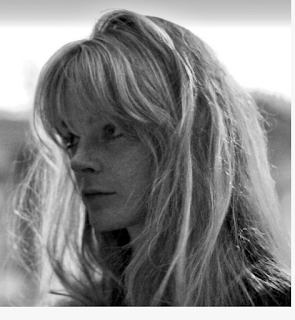
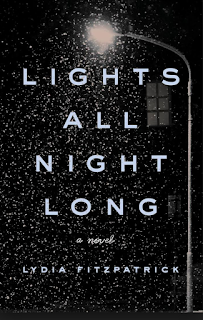
Lights All Night Long is about a young Russian exchange student in America, consumed with his troubled brother back home, who may or may not have committed a murder. About brotherhood, country, belonging and not belonging, and so much more, this is truly one of my favorite books of the year. And I'm not the only one to think so:
"Beyond the brothers’ crystalline characterizations, Fitzpatrick gifts her intriguing debut with elegant prose, affecting images, and rich settings.”—Booklist (starred review)
“This vivid coming-of-age novel spools out an engrossing mystery amid a tender story about family ties and adopted homes.” — Esquire
“A poised, graceful literary debut… An absorbing tale imparted with tenderness and compassion.”— Kirkus
“Fitzpatrick’s remarkable debut novel is a coming-of-age narrative interwoven with a gripping mystery.” — Shelf Awareness
“A glittering debut. . . . The murder mystery is intricate and well-crafted, but the highlight is the relationship between the two brothers—the shy brainiac and the charming addict—and in the smoldering, seething resentment felt by young people. This is a heartbreaking novel about the lengths to which people go to escape their own pain, and the prices people are willing to pay to alleviate the suffering of their loved ones.”—Publishers Weekly
Lydia Fitzpatrick’s work has appeared in the The O. Henry Prize Stories, The Best American Mystery Stories, One Story, Glimmer Train, and elsewhere. She was a Wallace Stegner Fellow at Stanford University, a fiction fellow at the Wisconsin Institute for Creative Writing, and a recipient of an Elizabeth George Foundation grant. She graduated from Princeton University and received an MFA from the University of Michigan. She lives in Los Angeles with her husband and daughters.
I'm so thrilled to host Lydia here. Thank you, Lydia
I always feel that writers are haunted into writing their novels. Were you? What was haunting you?
I love the way you put that—I do often write from personal fears, but there’s something a little gentler in thinking of it as a “haunting.” In my short stories, the specific fear is usually pretty easy to pinpoint. I wrote one story, “Safety,” in the wake of the Sandy Hook Elementary School shooting; I’d just had my eldest daughter, and I was consumed with both a desire to protect her and a dawning realization of how increasingly impossible that would be.
The fear at the center of Lights is a little more amorphous, but I think it actually has its roots in the same idea. My father died when I was twelve, and I was obsessed with protecting my remaining family—my mom and my brother—even though I knew I was pretty powerless to do so. I remember reciting these epic incantations for their safety every night. I’d list threats, like by naming them I could dispel them, and I’d worry that if I got a word wrong or left out a phrase, something would happen to them and it would be my fault. Nothing did happen to them (thank God, knock on wood), but this devotion and the fear that is its underbelly formed the root of Ilya’s character.
I love the whole idea of Ilya, an exchange student, especially a Russian one (my grandparents were Russian!) And this is so much a novel about the exchange of cultures—the gold ring of America and the tiny Russian town that puts Ilya’s brother in prison. Tell me about the research you did, please.
My mother is a Russian historian who lived and studied in Russia during the Cold War, and when I was little we hosted two Russian students, who became the most literal inspiration for Ilya. We also traveled to Russia as a family in the mid-‘90s. This was right after Yeltsin’s re-election, and while I knew, in a middle-school civics sort of way, that Russia was in the midst of a transition, I was still shocked by its manifestations. There was a dead body in the courtyard of our apartment building one morning. We used a Geiger counter to measure the radiation in the meat we cooked. In the Izmaylovo market, old men and women sold their old Soviet medals. So there was a lot of heartbreak, but there was also a dynamism and a volume of hope that stuck with me and found its way into Ilya’s story.
That’s a long way of saying that Russia was a presence in my life before the novel was, and my research, at least in the early stages, focused on making sense of, and putting into context, my own experiences there. I read political histories, oral histories, memoirs and newspaper articles about Russia in the ‘90s and 2000s. I went back to Russia with my mom on a research trip. I took Russian language classes and still do, though my Russian remains abysmal—I am no lingual prodigy like Ilya.
So much of this astonishing debut is about family ties, what we owe one another, how we protect ourselves and others, and what we are willing to do for love. Every page felt to me to be fierce with longing. What was it like to write such a novel?
This is a hard one to answer since I haven’t written any other novel! I think when I’m immersed in a story, I move beyond capturing the emotions of a character to a state of experiencing them in concert with him or her. If I’m not putting myself in emotional discomfort (whether its sadness or fear or longing) in the writing, then I’m not putting enough of myself on the page, and I think that manifests as an emotional distance between the reader and the characters. Of course the risk is sentimentality, but of all the sins a writer can commit, that one seems to me the most easily forgiven.
Of course I have to ask about your whole writing process and about being a debut author. What was it like? Did you map everything out? Did you have that elusive and mythological (I’m convinced) Muse on your side? And does having written such an already raved-about debut make it harder or easier to write your next novel?
I wish I could say that I’d mapped Lights out from day one, but for about a year and a half, I wrote in order to try to figure out what I wanted to write about, so the novel had a lot of early incarnations. At one point Sadie was the protagonist—and pregnant. In another version the perspective alternated between Sadie and her mother and her cousin, J.T.
While I’m generally pretty atheistic about the writing process, Ilya’s arrival in the story did feel like a kind of awakening, and his perspective pretty quickly eclipsed the others. Even though my process was incredibly inefficient (and made almost unbearably so because I do a daily revision of everything I’ve written before writing anything new!) I don’t think I could have found the novel in any other way. For me, so much of knowing what the story should focus on and where it should go comes from sensing the energy of my prose as I write it. It’s a little like roaming around with a dowsing rod, waiting for that tell-tale dip.
As for the second novel, Lights consumed my life for a long time, and I’m so excited about it coming out, that for the next few months I’m trying to let myself enjoy the publication process without worrying about when I’ll finish the next one. I sold the second novel based on a screenplay of mine, so the plot’s in place, and I’m hoping that it won’t require quite as much roaming with the dowsing rod as Lights did.
What’s obsessing you now and why?
Stacy Kranitz’s photos. The Mueller Report. Deciding what to read next. Belting out “Shallow” on the 101 with my daughters. Alice Munro, forever and always, and George Saunders too. Spicy margaritas. Antibiotic-resistant bacteria. This squirrel that looks in my bedroom window with a sort of aggressive glint in his (or her) eye. And, at all times—even when I’m singing “Shallow” on the highway—at least a third of my brain is wondering what I’d do if various forms of apocalypse strike, an issue that the current political climate has exacerbated. I’m writing this in bed (see below), and have no fewer than 20 MREs and a dozen Lifestraws directly underneath me, which is somewhat soothing.
What question didn’t I ask that I should have?
Where do you write?
In bed. By the time I pick up my kids from school, which is the end of my writing day, there are books strewn all over my quilt, a few coffee mugs on the nightstand, and I’m still in my pajamas. I happen to have no other option (besides the kitchen table, which is always a scene of total domestic chaos), but writing in bed is so incredibly pleasant that I wonder why more people don’t do it. <!-- /* Font Definitions */ @font-face {font-family:"Cambria Math"; panose-1:2 4 5 3 5 4 6 3 2 4; mso-font-charset:0; mso-generic-font-family:roman; mso-font-pitch:variable; mso-font-signature:-536870145 1107305727 0 0 415 0;} @font-face {font-family:Calibri; panose-1:2 15 5 2 2 2 4 3 2 4; mso-font-alt:Calibri; mso-font-charset:0; mso-generic-font-family:swiss; mso-font-pitch:variable; mso-font-signature:-520092929 1073786111 9 0 415 0;} /* Style Definitions */ p.MsoNormal, li.MsoNormal, div.MsoNormal {mso-style-unhide:no; mso-style-qformat:yes; mso-style-parent:""; margin:0in; margin-bottom:.0001pt; mso-pagination:widow-orphan; font-size:12.0pt; font-family:"Times New Roman",serif; mso-fareast-font-family:Calibri; mso-fareast-theme-font:minor-latin;} .MsoChpDefault {mso-style-type:export-only; mso-default-props:yes; mso-fareast-font-family:Calibri; mso-fareast-theme-font:minor-latin;} @page WordSection1 {size:8.5in 11.0in; margin:1.0in 1.0in 1.0in 1.25in; mso-header-margin:.5in; mso-footer-margin:.5in; mso-paper-source:0;} div.WordSection1 {page:WordSection1;} </style> -->
Published on April 02, 2019 08:40
March 20, 2019
What if just a cough robbed you of your life as you knew it? How would you fight your way back? Andrea Buchanan's THE BEGINNING OF EVERYTHING is that story and it's extraordinary.
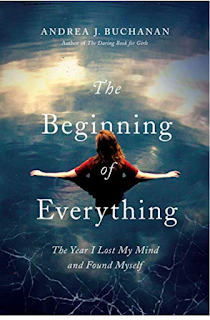

Oh my God.
I met Andi years ago and we hung out at a cafe and I watched happily and with admiration as she became quite famous with the DARING BOOK FOR GIRLS. And then I heard the news. Andi had coughed one day, which set off a terrifying medical mystery that had her bedridden and brain-fogged. Her memoir, The Beginning of Everything, f I could ask one small thing—in your intro can you add, after where it says “Her memoir, The Beginning of Everything,” about her experience with spontaneous spinal CSF leak, is essential because it tells us that any moment our lives can change--and it tells us that any moment we can find solutions.
I'm so proud to have Andi on the blog. Her life changed and she changed it again. And this book will change your life.
Thanks so much, Andi.
Here's the facts: Andrea J. Buchanan is a New York Times bestselling author whose latest book is THE BEGINNING OF EVERYTHING, which was named a finalist for the 2019 PEN/E.O. Wilson Award for Literary Science Writing. Her other work includes the multimedia young adult novel GIFT, the internationally bestselling THE DARING BOOK FOR GIRLS, her essay collection on early motherhood MOTHER SHOCK: LOVING EVERY (OTHER) MINUTE OF IT, and seven other books. Before becoming a writer, Andi trained as a pianist, earning a bachelor of music degree in piano performance from the Boston Conservatory of Music and a master's in piano performance from the San Francisco Conservatory. Her last recital was at Carnegie Hall's Weill Recital Hall. She lives with her family in Philadelphia.
Your book was in a word brilliant. I’m wondering if you ever go back and read it and see new things or if now that you’ve written it, you never want to think about it again, given that it was about a terrible time you went through and a terrifying illness?
Thank you so much, I’m so glad it resonated with you. This is a particularly timely question, as I just spent about three and a half days last week recording the audiobook version of The Beginning of Everything, which meant literally reading it aloud word for word, cover to cover. It was the first time I’d ever done that—I don’t think I’ve ever read an entire book of mine out loud before, even to myself!—and probably the first time I’d really read it through in a meaningful way since I’d gotten the first pass pages back in January of 2018, which had been my first opportunity to read it all the way through with it laid out and looking professional. Back then, reading through it fresh off the writing process, it was the first moment where I had a sense of the whole thing existing as one story, as a real book, and it was amazing to read through it with the thrill and humility and sheer relief of knowing for sure that it worked. Reading it through this time, a little over a year later, out loud, with a whole other year of healing and recovery and setbacks and etc. behind me, was a quietly emotional experience. In a way it felt like closure, a little bit of wrapping up of the puzzling and processing I’ve been doing ever since I first got sick. Being able to revisit it again and have more context for everything, more distance from everything, I was able to see which things I’ve been able to let go of, and which things still snag my heart.
When tragedy happened to me, I felt as if a layer of life had been ripped off and I truly saw what it was to be alive in the world—which was terrifying to me. From your astonishing book, it feels as though it was the same way for you. How do you manage, day to day, to not be in terror of something like –or any other strange and awful thing-- happening again? In a way, the title THE BEGINNING OF EVERYTHING is perfect, because I feel that it addresses this newness.
It was difficult, especially in the beginning, when I was forever in fear of relapsing, of doing some small thing and having the CFS leaking again. I had spent so much time tracing and retracing my steps, trying to find every tiny little thing that could have led to this, every small disaster I hadn’t noticed at the time, every risk I’d taken that I’d riskily dismissed, that it was hard not to be hypervigilant for the next thing, and the next. But at some point, I realized, this task was both fruitless and endless. There would never be one thing, one solid, graspable, definable answer for why what had happened to me had happened; and even the things I could point to—the cough, for instance—were things that had barely registered for me at the time as dangerous. And while that sense that everything could be horrible at any time, at all times, could feel claustrophobic and terrifying, it actually became the thing that freed me. I realized that if it was true that some small, insignificant thing, some tiny moment I’d barely noticed, truly had been the thing that made it all unravel for me—then it had probably already happened again without my noticing. There was a freedom in accepting that I had no control over it, and in accepting that the “bad things” had already happened. Because realizing that made me realize that my worry was useless. My worry wasn’t protecting me, it hadn’t protected me before. So why should I think it would protect me now? Realizing that helped loosen the grip of that existential terror just a bit.
For most of your illness, your brain was in a terrible fog, yet every page of your book is so intimate, so visceral, that it makes me wonder about how our memories work. In a way, the you that had recovered was writing about the you that was still in a fog. How difficult was this to come to terms with?
This book was extremely difficult to write, in part because of that reason. I wasn’t recovered when I wrote it; writing it was part of my recovery process. And so it was a real struggle. I didn’t feel too far off from that foggy, disconnected brain. I ended up having to do a lot of reporting on my own life—researching through medical notes from my physicians, plus text messages and email updates I’d sent while I was sick, and the odd journal entry I’d made when I had some moments of lucidity from time to time. The half-sentences I’d tapped into my phone here and there, and the strange bits of writing I attempted while sick—a fairy tale, it sounded like; a poem—were like cryptic messages from a ghost. Who was that person? What did that even mean? But I tried to use those, to help reconstruct that time, and recapture it. Probably the most difficult part for me in trying to write about it—aside from the things that every writer wrestles with in writing every book, namely, Is this any good??? Does this actually work???—was that I was trying to create a narrative of a time when I existed outside of narrative, unable to understand or even tell the story of what was happening to me. So the act of giving it a narrative meant revisiting that traumatic time, where my trauma had insulated me from fully experiencing narrative, and that in itself was traumatizing, too. It’s part of why I address so directly in the book the process of creating narrative, and the limits of storytelling, and the fundamental unreliability of narration.
Your rehab with the piano made me wonder yet again about the ways our brains work. Music soothes us, so does repetition and refinding what we knew before. You mention more than a few times that you are an unreliable narrator—but aren’t we all really unreliable narrators, our experiences colored by emotions
Yes, absolutely, even with the best intentions and the most thorough research and using the most precise language. The “I” that tells the story is always subjective. This fascinated me and troubled me precisely because of the way my experience of myself became so fraught and strange due to the dissociation caused by my physical condition. There were times when “I” felt absent, when it seemed as though my brain went on existing without the need for mind, and the process of healing felt like a gradual reintegration. But those moments of separation, of this strange clarity about the dual nature of brain and mind, haunted me, and really called into question who is telling the story when we’re dealing with a so-called first-person narration. During much of my illness, I felt like a second-person, the me that was Me tucked away somewhere while my first-person brain got on with the business of staying alive. Tackling this directly in the book, with those chapters that wrestle with the notion of unreliable narration, the way women in particular are often seen as unreliable narrators of their own history in the doctor’s office, and the desperate need for storytelling while acknowledging the crushing limits of storytelling, was my way of working through this.
I always wonder about process, usually if writers learn from their past novels or if every novel is a brand new terrifying thing to contemplate. However, your case is something very different, as you are trying to make sense of something that had no sense. But the question I want to ask you is more about your NEXT book. How do you think you will now approach writing differently?
I always tell people, when they ask for writing advice, that the best process is the one that gets the book done, and that each book teaches you how to write it as you go. That was hard advice to take myself as I worked on this book. It fought me every step of the way, and every day I doubted it, every day I thought about giving up. There was no moment when I read over something and thought, Yes! This is it! This is great! Instead, every day was slow and frustrating and filled with questions and uncertainty. A lot like healing. It was only in the end, once it was finished, that I was able to see it come together, and I remember reading those first pass pages with something it took me a moment to identify as pride—a word I would have never used to describe anything about my own work. I learned a lot about myself as a writer by writing this book, and it was a learning process getting to know my new brain, my brain post–CSF leak, my brain post-trauma. I’m excited to bring that to whatever comes next, and I’m glad to have had the humbling experience of working through something that seemed impossible and coming out the other side okay.
I have to ask: Are you feeling okay? Do you feel normal or is there a new normal?
I am definitely okay, for now, CFS leak-wise. The procedure I had to fix my spinal CSF leak worked, and although full recovery from that took a while (about two years for all the post-procedure symptoms to go away and for my brain to fully heal), I’m happy to say that I’m all better in that respect. My new normal is a bit complicated, though, as I’m dealing with a chronic health condition that was exacerbated by the CSF leak and has become its own problematic thing. So for now I’m trying to rest and relearn my limits and try not to poke the hornet’s nest of my own body being hypervigilant against itself.
What’s obsessing you now and why?
I started knitting about 9 months ago, when I was in the grips of this aforementioned health situation that limited my activity. Actually, I had learned to knit when I was little—my mom taught me to knit and crochet when I was 8 or 9. But a super talented friend inspired me to pick it up again, and after a visit to a cool yarn store near my house, I was in! Lately I’ve been trying to do a lot of lace—I finished a lace shawl for myself and I’m working on another one to give as a gift, plus I started a cowl with a bit of a lace pattern. It’s tricky and occasionally frustrating (and I never realized until I started doing it how bad I am at counting???), but it’s good brain-work, and in the end you have an actual thing you made that’s wearable and beautiful and kind of like a visual representation of what time looks like in yarn.
What question didn’t I ask that I should have?
I can’t think of one! These were all fantastic. Thanks for sparking this conversation!<!-- /* Font Definitions */ @font-face {font-family:"<span class="goog-spellcheck-word" style="background: yellow none repeat scroll 0% 0%;" id=":dg.431" tabindex="-1" role="menuitem" aria-haspopup="true">Cambria</span> Math"; <span class="goog-spellcheck-word" style="background: yellow none repeat scroll 0% 0%;" id=":dg.433" tabindex="-1" role="menuitem" aria-haspopup="true">panose</span>-1:2 4 5 3 5 4 6 3 2 4; <span class="goog-spellcheck-word" style="background: yellow none repeat scroll 0% 0%;" id=":dg.445" tabindex="-1" role="menuitem" aria-haspopup="true">mso</span>-font-<span class="goog-spellcheck-word" style="background: yellow none repeat scroll 0% 0%;" id=":dg.447" tabindex="-1" role="menuitem" aria-haspopup="true">charset</span>:0; <span class="goog-spellcheck-word" style="background: yellow none repeat scroll 0% 0%;" id=":dg.449" tabindex="-1" role="menuitem" aria-haspopup="true">mso</span>-generic-font-family:roman; <span class="goog-spellcheck-word" style="background: yellow none repeat scroll 0% 0%;" id=":dg.453" tabindex="-1" role="menuitem" aria-haspopup="true">mso</span>-font-pitch:variable; <span class="goog-spellcheck-word" style="background: yellow none repeat scroll 0% 0%;" id=":dg.457" tabindex="-1" role="menuitem" aria-haspopup="true">mso</span>-font-signature:-536870145 1107305727 0 0 415 0;} @font-face {font-family:<span class="goog-spellcheck-word" style="background: yellow none repeat scroll 0% 0%;" id=":dg.469" tabindex="-1" role="menuitem" aria-haspopup="true">Calibri</span>; <span class="goog-spellcheck-word" style="background: yellow none repeat scroll 0% 0%;" id=":dg.470" tabindex="-1" role="menuitem" aria-haspopup="true">panose</span>-1:2 15 5 2 2 2 4 3 2 4; <span class="goog-spellcheck-word" style="background: yellow none repeat scroll 0% 0%;" id=":dg.482" tabindex="-1" role="menuitem" aria-haspopup="true">mso</span>-font-alt:<span class="goog-spellcheck-word" style="background: yellow none repeat scroll 0% 0%;" id=":dg.485" tabindex="-1" role="menuitem" aria-haspopup="true">Calibri</span>; <span class="goog-spellcheck-word" style="background: yellow none repeat scroll 0% 0%;" id=":dg.486" tabindex="-1" role="menuitem" aria-haspopup="true">mso</span>-font-<span class="goog-spellcheck-word" style="background: yellow none repeat scroll 0% 0%;" id=":dg.488" tabindex="-1" role="menuitem" aria-haspopup="true">charset</span>:0; <span class="goog-spellcheck-word" style="background: yellow none repeat scroll 0% 0%;" id=":dg.490" tabindex="-1" role="menuitem" aria-haspopup="true">mso</span>-generic-font-family:<span class="goog-spellcheck-word" style="background: yellow none repeat scroll 0% 0%;" id=":dg.493" tabindex="-1" role="menuitem" aria-haspopup="true">swiss</span>; <span class="goog-spellcheck-word" style="background: yellow none repeat scroll 0% 0%;" id=":dg.494" tabindex="-1" role="menuitem" aria-haspopup="true">mso</span>-font-pitch:variable; <span class="goog-spellcheck-word" style="background: yellow none repeat scroll 0% 0%;" id=":dg.498" tabindex="-1" role="menuitem" aria-haspopup="true">mso</span>-font-signature:-520092929 1073786111 9 0 415 0;} /* Style Definitions */ p.<span class="goog-spellcheck-word" style="background: yellow none repeat scroll 0% 0%;" id=":dg.510" tabindex="-1" role="menuitem" aria-haspopup="true">MsoNormal</span>, <span class="goog-spellcheck-word" style="background: yellow none repeat scroll 0% 0%;" id=":dg.511" tabindex="-1" role="menuitem" aria-haspopup="true">li</span>.<span class="goog-spellcheck-word" style="background: yellow none repeat scroll 0% 0%;" id=":dg.512" tabindex="-1" role="menuitem" aria-haspopup="true">MsoNormal</span>, div.<span class="goog-spellcheck-word" style="background: yellow none repeat scroll 0% 0%;" id=":dg.514" tabindex="-1" role="menuitem" aria-haspopup="true">MsoNormal</span> {<span class="goog-spellcheck-word" style="background: yellow none repeat scroll 0% 0%;" id=":dg.515" tabindex="-1" role="menuitem" aria-haspopup="true">mso</span>-style-<span class="goog-spellcheck-word" style="background: yellow none repeat scroll 0% 0%;" id=":dg.517" tabindex="-1" role="menuitem" aria-haspopup="true">unhide</span>:no; <span class="goog-spellcheck-word" style="background: yellow none repeat scroll 0% 0%;" id=":dg.518" tabindex="-1" role="menuitem" aria-haspopup="true">mso</span>-style-<span class="goog-spellcheck-word" style="background: yellow none repeat scroll 0% 0%;" id=":dg.520" tabindex="-1" role="menuitem" aria-haspopup="true">qformat</span>:yes; <span class="goog-spellcheck-word" style="background: yellow none repeat scroll 0% 0%;" id=":dg.522" tabindex="-1" role="menuitem" aria-haspopup="true">mso</span>-style-parent:""; margin:0in; margin-bottom:.0001pt; <span class="goog-spellcheck-word" style="background: yellow none repeat scroll 0% 0%;" id=":dg.530" tabindex="-1" role="menuitem" aria-haspopup="true">mso</span>-pagination:widow-orphan; font-size:12.0pt; font-family:"Times New Roman",serif; <span class="goog-spellcheck-word" style="background: yellow none repeat scroll 0% 0%;" id=":dg.541" tabindex="-1" role="menuitem" aria-haspopup="true">mso</span>-<span class="goog-spellcheck-word" style="background: yellow none repeat scroll 0% 0%;" id=":dg.542" tabindex="-1" role="menuitem" aria-haspopup="true">fareast</span>-font-family:<span class="goog-spellcheck-word" style="background: yellow none repeat scroll 0% 0%;" id=":dg.544" tabindex="-1" role="menuitem" aria-haspopup="true">Calibri</span>; <span class="goog-spellcheck-word" style="background: yellow none repeat scroll 0% 0%;" id=":dg.545" tabindex="-1" role="menuitem" aria-haspopup="true">mso</span>-<span class="goog-spellcheck-word" style="background: yellow none repeat scroll 0% 0%;" id=":dg.546" tabindex="-1" role="menuitem" aria-haspopup="true">fareast</span>-theme-font:minor-<span class="goog-spellcheck-word" style="background: yellow none repeat scroll 0% 0%;" id=":dg.550" tabindex="-1" role="menuitem" aria-haspopup="true">latin</span>;} .<span class="goog-spellcheck-word" style="background: yellow none repeat scroll 0% 0%;" id=":dg.551" tabindex="-1" role="menuitem" aria-haspopup="true">MsoChpDefault</span> {<span class="goog-spellcheck-word" style="background: yellow none repeat scroll 0% 0%;" id=":dg.552" tabindex="-1" role="menuitem" aria-haspopup="true">mso</span>-style-type:export-only; <span class="goog-spellcheck-word" style="background: yellow none repeat scroll 0% 0%;" id=":dg.557" tabindex="-1" role="menuitem" aria-haspopup="true">mso</span>-default-props:yes; <span class="goog-spellcheck-word" style="background: yellow none repeat scroll 0% 0%;" id=":dg.561" tabindex="-1" role="menuitem" aria-haspopup="true">mso</span>-<span class="goog-spellcheck-word" style="background: yellow none repeat scroll 0% 0%;" id=":dg.562" tabindex="-1" role="menuitem" aria-haspopup="true">fareast</span>-font-family:<span class="goog-spellcheck-word" style="background: yellow none repeat scroll 0% 0%;" id=":dg.564" tabindex="-1" role="menuitem" aria-haspopup="true">Calibri</span>; <span class="goog-spellcheck-word" style="background: yellow none repeat scroll 0% 0%;" id=":dg.565" tabindex="-1" role="menuitem" aria-haspopup="true">mso</span>-<span class="goog-spellcheck-word" style="background: yellow none repeat scroll 0% 0%;" id=":dg.566" tabindex="-1" role="menuitem" aria-haspopup="true">fareast</span>-theme-font:minor-<span class="goog-spellcheck-word" style="background: yellow none repeat scroll 0% 0%;" id=":dg.570" tabindex="-1" role="menuitem" aria-haspopup="true">latin</span>;} @page WordSection1 {size:8.5in 11.0in; margin:1.0in 1.0in 1.0in 1.25in; <span class="goog-spellcheck-word" style="background: yellow none repeat scroll 0% 0%;" id=":dg.586" tabindex="-1" role="menuitem" aria-haspopup="true">mso</span>-header-margin:.5in; <span class="goog-spellcheck-word" style="background: yellow none repeat scroll 0% 0%;" id=":dg.590" tabindex="-1" role="menuitem" aria-haspopup="true">mso</span>-footer-margin:.5in; <span class="goog-spellcheck-word" style="background: yellow none repeat scroll 0% 0%;" id=":dg.594" tabindex="-1" role="menuitem" aria-haspopup="true">mso</span>-paper-source:0;} div.WordSection1 {page:WordSection1;} </style> -->
Published on March 20, 2019 08:34
March 17, 2019
A brilliantly epic saga about art (think Tiffany), the ends and beginnings of lives, communes, and the dazzle of secrets. The sublime Lisa Gornick talks about her racking-up the raves novel THE PEACOCK FEAST.
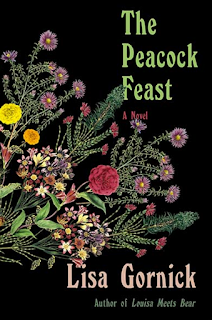
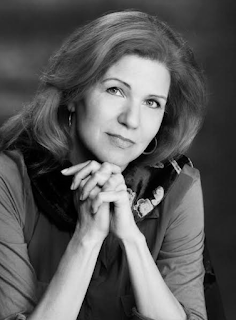
I first met Lisa Gornick through her novels, which I loved and was astonished by. But I didn't get to actually meet her in person until she published Louisa Meets Bear, and I was smitten by her intellect, her warmth and I wanted nothing more than to hang out with her. Her latest novel, THE PEACOCK FEAST, about generations of family and the secrets that seem to keep them, is so dazzling, that I found myself rereading pages. And I'm not the only one, because look at some of the raves pouring in:
"An intricate, emotionally complex and glorious chronicle . . . Swerves and fatal mistakes abound . . . [in] this magical novel.”
–Jane Ciabattari, BBC-Culture
“[A] wonderfully complex, many-stranded novel . . . The Peacock Feast is marvelously rich in character, event and locale . . . A thoroughly rewarding novel and, though not terribly long, a truly mighty one.”
—Katherine A. Powers, Newsday
“Lisa Gornick…has crafted a perfect novel in The Peacock Feast… [A] luxurious novel . . .It’s a book that beckons readers to get lost in its tapestry.”
— New Jersey Star-Ledger
“Fun, trenchant, immersive . . . but on top of that I got historical and psychological mystery, art history, and several different lush settings . . . Exactly the book I needed.”
–Rebecca Makkai, Electric Literature
Lisa has been hailed by NPR as “one of the most perceptive, compassionate writers of fiction in America…immensely talented and brave.” She is also the author of Louisa Meets Bear, and Tinderbox—all published by Sarah Crichton Books/Farrar, Straus and Giroux, and Picador—as well as A Private Sorcery, published by Algonquin. Lisa lives in New York City with her husband and two sons.
I'm so thrilled and honored to have her here, Lisa. Thank you so, so much.
I always think that writers are haunted into writing their books. What was haunting you to
write The Peacock Feast?
One snowy February day, now over a decade ago, I wandered into an exhibit at the Metropolitan Museum of Art about Laurelton Hall, the dream-like estate Louis C. Tiffany, known largely for his works in glass, built in Oyster Bay, Long Island on 588 lavishly landscaped acres. Unlike many of the mansions of the Gilded Era that were reproductions of a French chateau or British manor, Laurelton Hall was a stylistic hodge-podge heavily influenced by Tiffany’s interest in Orientalist arts. There was a fountain court modeled after the Topkapi palace in Istanbul, a loggia with columns topped by ceramic blooms inspired by the Agra Fort in India, and a blue-tiled minaret that housed the heating system. What stopped me in my tracks, however, was a photograph (now the frontispiece of the novel) of a procession of five young women dressed in white Grecian gowns with straps that encircled their breasts and buttocks. The woman leading the group wore a cap made from the head of a peacock with its beak resting on her forehead. She and the two behind her held silver salvers on their shoulders with a roasted peacock atop, while the others carried bouquets of peacock feathers. Who had conceived of this horrifying but gorgeous tableau, like an illustration for a Grimm’s fairytale? And who were these young women? By the time I began to have a sense of the answers, the seed for a novel had been planted.
Grace’s details of being raised in a commune were amazing. What was your research like?
I’m so glad you asked about this because the story of Grace’s parents’ move to Riva Crik—the fictional commune in Mendocino County where Grace and her twin brother, Garcia, are born—is easily overshadowed by the Tiffany strand of the novel. I started with an idea about how the hints in 1963 San Francisco of looming change seep into the consciousness of an adolescent, himself on the precipice between childhood and adult life. Forgive me for quoting from the novel, but it more concisely captures the interface between external and internal reality than I could do by paraphrasing:
Leo did not know about the lysergic acid experiments being carried out in Menlo Park to the south or that the Haight would become the sanctuary for seekers and lost souls from Maine to Texas, but he could sense it. It was as though he’d been given truth glasses and the life he led in the Presidio and Pacific Heights suddenly looked absurd: the navy blazer he wore to school, the tennis whites required on the courts at his grandparents’ club, the striped tie for Sunday dinners—costumes of a bygone era.
I was familiar with the history of the Haight from having worked at the Haight-Ashbury Free Medical Clinic. As for the communes of Northern California, a lot has been written about the experiments in collective living inspired by the sixties counterculture and some of the newsletters and magazines published by the communes in those years are available, but the era came most alive for me during a visit to Mendocino when some of the original commune members, still living on the same land, generously allowed me to interview them.
Was there anything astonishing that you wanted to use and you didn’t?
Oh my goodness, I fell down the novelist’s proverbial research rabbit hole with Ken Kesey and the Merry Pranksters. Astonishing only tamely scratches the surface with regards to their adventures crossing the country in a psychedelically painted bus dressed in outlandish hand-made clothing with music blasting from speakers mounted on the roof and a jug of LSD-laced orange juice stashed aboard. In early drafts, many of the Pranksters—Kesey, Mountain Girl, Neil Cassady, Stark Naked—and others in their circle—Larry McMurtry, Jerry Garcia, Alan Ginsberg—had their own scenes. I also had a long chapter about Grace’s mother’s last year of high school in Houston, including the day before the Kennedy assassination when she goes with her mother to the Houston Hobby airport to join the bystanders greeting LBJ and Lady Bird as they descend the steps from Air Force Two, and then the President and Jackie, in a white dress with a poplin top and a black pillbox hat, as they wave from the door of Air Force One. You know the adage about killing your darlings. I loved some of these stories for the way they capture the seismic shifts of the time, but my sage agent and editor convinced me of the eye-rolling dangers of having my fictional characters bumping up with these sixties icons—as clichéd as having a character in 1920s Paris at the Café Rotonde where it just happens that at the adjacent table Fitzgerald and Hemingway are discussing the manuscript of The Sun Also Rises. Coincidences are thrilling in life but treacherous in novels.
So much of this extraordinary novel is about time and secrets and the intersection of lives,
particularly of two very different women. Why is it that secrets gain power the longer they
are kept, do you think?
To be prosaic, secrets are like a water leak. You may start off with a hairline crack and a few drops of water on the surface of a pipe, but as time goes on the collateral damage seeps into distant places. Part of this collateral damage, in my view, is that we lose touch with what happened as opposed to our story of what happened such that reality, memory, and fantasy become intertwined and difficult to distinguish. Writing fiction carries similar risks. You may start off with the kernel of something experienced, and then you change what happened, either to protect the persons who were involved or to make the situation more resonant, and end up with the fiction more vivid than the recollection.
In the novel, two women, separated by a continent and two generations, have both been impacted by the same event from a century before. Returning to the water leak analogy, it’s as though they live in the same building but don’t know each other or how their lives are connected by each suffering the different impacts—for one, perhaps, the ceiling mysteriously collapses; for the other, the walls are filled with mice—of the same hairline crack.
Three generations plus a hundred years is daunting for any writer. (Prudence, after all, goes
from four to one hundred and one!) How did you map all of this out? How did you keep
track, and was there ever a moment where you felt: oh, this is too much for me to do? (Not
that I think YOU have this problem, but I do when I write.) And how daunting was it to base
parts of the novel on real historical events?
Novelists look at one another’s finished work and think, Oh, that writer didn’t trudge through the swampy confusion I did! The Peacock Feast required an insane amount of work: the research (not only about the Tiffany and Freud families and the 1960s, but also about hospice work and capital punishment in Texas in the 1970s and 1980s, when youth were executed), figuring out the structure, threading the mystery the secret spurred with the hope that it would both come as a surprise and seem inevitable. Because I was committed to respecting what I know of historical reality, I had to keep elaborate timelines about the relevant dates of events in the lives of Louis C. Tiffany, Dorothy and Robert Burlingham, the Freud family, and Grace Slick—and then make sure that when my fictional characters interacted with the historical ones, the sequences aligned.
I always wonder about process, if writers learn from their past novels or if every novel is a
brand new terrifying thing to contemplate. Can you talk about this please?
One of the main distinctions, I think, between literary fiction and genre fiction is that literary fiction writers are always trying to do something new: to stretch the boundaries both of what they’ve accomplished with their prior work and what the ever-changing form of the novel itself has done. Given that aim, for me, writing never becomes easier. What has changed is that I better understand my own process: the need to allow for confusion, for days when the work feels wooden, for how God-awful my early drafts are, for the role of reading in my work—and I better understand how and when to receive feedback and what to do with it. It’s a painful endeavor at nearly every phase of the process. The longer I work at fiction, which, in my case feels more like an obsession or fate than a choice, the more I believe the overused saying: don’t become a writer unless there’s no other way you can imagine a satisfying life.
What’s obsessing you now and why?
I’m obsessed these days with conciseness on every level and how that relates to the compression and depiction of deep feeling, and with the resonances between structure in music and structure in novels. It’s all a bit wonky and an excuse for a lot of reading, which is a great pleasure for me. And, like so many of us, I’m obsessed with the boundary between memoir and novels, and between truth and fiction: the ethics as well as the artistry.
What question didn’t I ask that I should have?
You’ve asked marvelous questions, and I think I’ve said enough for readers to have a hunch as to whether my book will sing to them now. Thank you!<!-- /* Font Definitions */ @font-face {font-family:"<span class="goog-spellcheck-word" style="background: yellow none repeat scroll 0% 0%;" id=":dj.408" tabindex="-1" role="menuitem" aria-haspopup="true">Cambria</span> Math"; <span class="goog-spellcheck-word" style="background: yellow none repeat scroll 0% 0%;" id=":dj.410" tabindex="-1" role="menuitem" aria-haspopup="true">panose</span>-1:2 4 5 3 5 4 6 3 2 4; <span class="goog-spellcheck-word" style="background: yellow none repeat scroll 0% 0%;" id=":dj.422" tabindex="-1" role="menuitem" aria-haspopup="true">mso</span>-font-<span class="goog-spellcheck-word" style="background: yellow none repeat scroll 0% 0%;" id=":dj.424" tabindex="-1" role="menuitem" aria-haspopup="true">charset</span>:0; <span class="goog-spellcheck-word" style="background: yellow none repeat scroll 0% 0%;" id=":dj.426" tabindex="-1" role="menuitem" aria-haspopup="true">mso</span>-generic-font-family:roman; <span class="goog-spellcheck-word" style="background: yellow none repeat scroll 0% 0%;" id=":dj.430" tabindex="-1" role="menuitem" aria-haspopup="true">mso</span>-font-pitch:variable; <span class="goog-spellcheck-word" style="background: yellow none repeat scroll 0% 0%;" id=":dj.434" tabindex="-1" role="menuitem" aria-haspopup="true">mso</span>-font-signature:-536870145 1107305727 0 0 415 0;} @font-face {font-family:<span class="goog-spellcheck-word" style="background: yellow none repeat scroll 0% 0%;" id=":dj.446" tabindex="-1" role="menuitem" aria-haspopup="true">Calibri</span>; <span class="goog-spellcheck-word" style="background: yellow none repeat scroll 0% 0%;" id=":dj.447" tabindex="-1" role="menuitem" aria-haspopup="true">panose</span>-1:2 15 5 2 2 2 4 3 2 4; <span class="goog-spellcheck-word" style="background: yellow none repeat scroll 0% 0%;" id=":dj.459" tabindex="-1" role="menuitem" aria-haspopup="true">mso</span>-font-alt:<span class="goog-spellcheck-word" style="background: yellow none repeat scroll 0% 0%;" id=":dj.462" tabindex="-1" role="menuitem" aria-haspopup="true">Calibri</span>; <span class="goog-spellcheck-word" style="background: yellow none repeat scroll 0% 0%;" id=":dj.463" tabindex="-1" role="menuitem" aria-haspopup="true">mso</span>-font-<span class="goog-spellcheck-word" style="background: yellow none repeat scroll 0% 0%;" id=":dj.465" tabindex="-1" role="menuitem" aria-haspopup="true">charset</span>:0; <span class="goog-spellcheck-word" style="background: yellow none repeat scroll 0% 0%;" id=":dj.467" tabindex="-1" role="menuitem" aria-haspopup="true">mso</span>-generic-font-family:<span class="goog-spellcheck-word" style="background: yellow none repeat scroll 0% 0%;" id=":dj.470" tabindex="-1" role="menuitem" aria-haspopup="true">swiss</span>; <span class="goog-spellcheck-word" style="background: yellow none repeat scroll 0% 0%;" id=":dj.471" tabindex="-1" role="menuitem" aria-haspopup="true">mso</span>-font-pitch:variable; <span class="goog-spellcheck-word" style="background: yellow none repeat scroll 0% 0%;" id=":dj.475" tabindex="-1" role="menuitem" aria-haspopup="true">mso</span>-font-signature:-520092929 1073786111 9 0 415 0;} /* Style Definitions */ p.<span class="goog-spellcheck-word" style="background: yellow none repeat scroll 0% 0%;" id=":dj.487" tabindex="-1" role="menuitem" aria-haspopup="true">MsoNormal</span>, <span class="goog-spellcheck-word" style="background: yellow none repeat scroll 0% 0%;" id=":dj.488" tabindex="-1" role="menuitem" aria-haspopup="true">li</span>.<span class="goog-spellcheck-word" style="background: yellow none repeat scroll 0% 0%;" id=":dj.489" tabindex="-1" role="menuitem" aria-haspopup="true">MsoNormal</span>, div.<span class="goog-spellcheck-word" style="background: yellow none repeat scroll 0% 0%;" id=":dj.491" tabindex="-1" role="menuitem" aria-haspopup="true">MsoNormal</span> {<span class="goog-spellcheck-word" style="background: yellow none repeat scroll 0% 0%;" id=":dj.492" tabindex="-1" role="menuitem" aria-haspopup="true">mso</span>-style-<span class="goog-spellcheck-word" style="background: yellow none repeat scroll 0% 0%;" id=":dj.494" tabindex="-1" role="menuitem" aria-haspopup="true">unhide</span>:no; <span class="goog-spellcheck-word" style="background: yellow none repeat scroll 0% 0%;" id=":dj.496" tabindex="-1" role="menuitem" aria-haspopup="true">mso</span>-style-<span class="goog-spellcheck-word" style="background: yellow none repeat scroll 0% 0%;" id=":dj.498" tabindex="-1" role="menuitem" aria-haspopup="true">qformat</span>:yes; <span class="goog-spellcheck-word" style="background: yellow none repeat scroll 0% 0%;" id=":dj.500" tabindex="-1" role="menuitem" aria-haspopup="true">mso</span>-style-parent:""; margin:0in; margin-bottom:.0001pt; line-height:200%; <span class="goog-spellcheck-word" style="background: yellow none repeat scroll 0% 0%;" id=":dj.511" tabindex="-1" role="menuitem" aria-haspopup="true">mso</span>-pagination:widow-orphan; font-size:12.0pt; <span class="goog-spellcheck-word" style="background: yellow none repeat scroll 0% 0%;" id=":dj.519" tabindex="-1" role="menuitem" aria-haspopup="true">mso</span>-<span class="goog-spellcheck-word" style="background: yellow none repeat scroll 0% 0%;" id=":dj.520" tabindex="-1" role="menuitem" aria-haspopup="true">bidi</span>-font-size:11.0pt; font-family:"Times New Roman",serif; <span class="goog-spellcheck-word" style="background: yellow none repeat scroll 0% 0%;" id=":dj.529" tabindex="-1" role="menuitem" aria-haspopup="true">mso</span>-<span class="goog-spellcheck-word" style="background: yellow none repeat scroll 0% 0%;" id=":dj.530" tabindex="-1" role="menuitem" aria-haspopup="true">fareast</span>-font-family:<span class="goog-spellcheck-word" style="background: yellow none repeat scroll 0% 0%;" id=":dj.532" tabindex="-1" role="menuitem" aria-haspopup="true">Calibri</span>; <span class="goog-spellcheck-word" style="background: yellow none repeat scroll 0% 0%;" id=":dj.533" tabindex="-1" role="menuitem" aria-haspopup="true">mso</span>-<span class="goog-spellcheck-word" style="background: yellow none repeat scroll 0% 0%;" id=":dj.534" tabindex="-1" role="menuitem" aria-haspopup="true">fareast</span>-theme-font:minor-<span class="goog-spellcheck-word" style="background: yellow none repeat scroll 0% 0%;" id=":dj.538" tabindex="-1" role="menuitem" aria-haspopup="true">latin</span>; <span class="goog-spellcheck-word" style="background: yellow none repeat scroll 0% 0%;" id=":dj.539" tabindex="-1" role="menuitem" aria-haspopup="true">mso</span>-<span class="goog-spellcheck-word" style="background: yellow none repeat scroll 0% 0%;" id=":dj.540" tabindex="-1" role="menuitem" aria-haspopup="true">bidi</span>-font-family:"Times New Roman"; <span class="goog-spellcheck-word" style="background: yellow none repeat scroll 0% 0%;" id=":dj.544" tabindex="-1" role="menuitem" aria-haspopup="true">mso</span>-<span class="goog-spellcheck-word" style="background: yellow none repeat scroll 0% 0%;" id=":dj.545" tabindex="-1" role="menuitem" aria-haspopup="true">bidi</span>-theme-font:minor-<span class="goog-spellcheck-word" style="background: yellow none repeat scroll 0% 0%;" id=":dj.549" tabindex="-1" role="menuitem" aria-haspopup="true">bidi</span>;} .<span class="goog-spellcheck-word" style="background: yellow none repeat scroll 0% 0%;" id=":dj.550" tabindex="-1" role="menuitem" aria-haspopup="true">MsoChpDefault</span> {<span class="goog-spellcheck-word" style="background: yellow none repeat scroll 0% 0%;" id=":dj.551" tabindex="-1" role="menuitem" aria-haspopup="true">mso</span>-style-type:export-only; <span class="goog-spellcheck-word" style="background: yellow none repeat scroll 0% 0%;" id=":dj.555" tabindex="-1" role="menuitem" aria-haspopup="true">mso</span>-default-props:yes; <span class="goog-spellcheck-word" style="background: yellow none repeat scroll 0% 0%;" id=":dj.559" tabindex="-1" role="menuitem" aria-haspopup="true">mso</span>-<span class="goog-spellcheck-word" style="background: yellow none repeat scroll 0% 0%;" id=":dj.560" tabindex="-1" role="menuitem" aria-haspopup="true">bidi</span>-font-size:11.0pt; <span class="goog-spellcheck-word" style="background: yellow none repeat scroll 0% 0%;" id=":dj.565" tabindex="-1" role="menuitem" aria-haspopup="true">mso</span>-<span class="goog-spellcheck-word" style="background: yellow none repeat scroll 0% 0%;" id=":dj.566" tabindex="-1" role="menuitem" aria-haspopup="true">fareast</span>-font-family:<span class="goog-spellcheck-word" style="background: yellow none repeat scroll 0% 0%;" id=":dj.568" tabindex="-1" role="menuitem" aria-haspopup="true">Calibri</span>; <span class="goog-spellcheck-word" style="background: yellow none repeat scroll 0% 0%;" id=":dj.569" tabindex="-1" role="menuitem" aria-haspopup="true">mso</span>-<span class="goog-spellcheck-word" style="background: yellow none repeat scroll 0% 0%;" id=":dj.570" tabindex="-1" role="menuitem" aria-haspopup="true">fareast</span>-theme-font:minor-<span class="goog-spellcheck-word" style="background: yellow none repeat scroll 0% 0%;" id=":dj.574" tabindex="-1" role="menuitem" aria-haspopup="true">latin</span>; <span class="goog-spellcheck-word" style="background: yellow none repeat scroll 0% 0%;" id=":dj.575" tabindex="-1" role="menuitem" aria-haspopup="true">mso</span>-<span class="goog-spellcheck-word" style="background: yellow none repeat scroll 0% 0%;" id=":dj.576" tabindex="-1" role="menuitem" aria-haspopup="true">bidi</span>-font-family:"Times New Roman"; <span class="goog-spellcheck-word" style="background: yellow none repeat scroll 0% 0%;" id=":dj.580" tabindex="-1" role="menuitem" aria-haspopup="true">mso</span>-<span class="goog-spellcheck-word" style="background: yellow none repeat scroll 0% 0%;" id=":dj.581" tabindex="-1" role="menuitem" aria-haspopup="true">bidi</span>-theme-font:minor-<span class="goog-spellcheck-word" style="background: yellow none repeat scroll 0% 0%;" id=":dj.585" tabindex="-1" role="menuitem" aria-haspopup="true">bidi</span>;} .<span class="goog-spellcheck-word" style="background: yellow none repeat scroll 0% 0%;" id=":dj.586" tabindex="-1" role="menuitem" aria-haspopup="true">MsoPapDefault</span> {<span class="goog-spellcheck-word" style="background: yellow none repeat scroll 0% 0%;" id=":dj.587" tabindex="-1" role="menuitem" aria-haspopup="true">mso</span>-style-type:export-only; line-height:200%;} @page WordSection1 {size:8.5in 11.0in; margin:1.0in 1.0in 1.0in 1.0in; <span class="goog-spellcheck-word" style="background: yellow none repeat scroll 0% 0%;" id=":dj.610" tabindex="-1" role="menuitem" aria-haspopup="true">mso</span>-header-margin:.5in; <span class="goog-spellcheck-word" style="background: yellow none repeat scroll 0% 0%;" id=":dj.614" tabindex="-1" role="menuitem" aria-haspopup="true">mso</span>-footer-margin:.5in; <span class="goog-spellcheck-word" style="background: yellow none repeat scroll 0% 0%;" id=":dj.618" tabindex="-1" role="menuitem" aria-haspopup="true">mso</span>-paper-source:0;} div.WordSection1 {page:WordSection1;} </style> -->
Published on March 17, 2019 06:21



